Ocellus SummerIssue50 2023
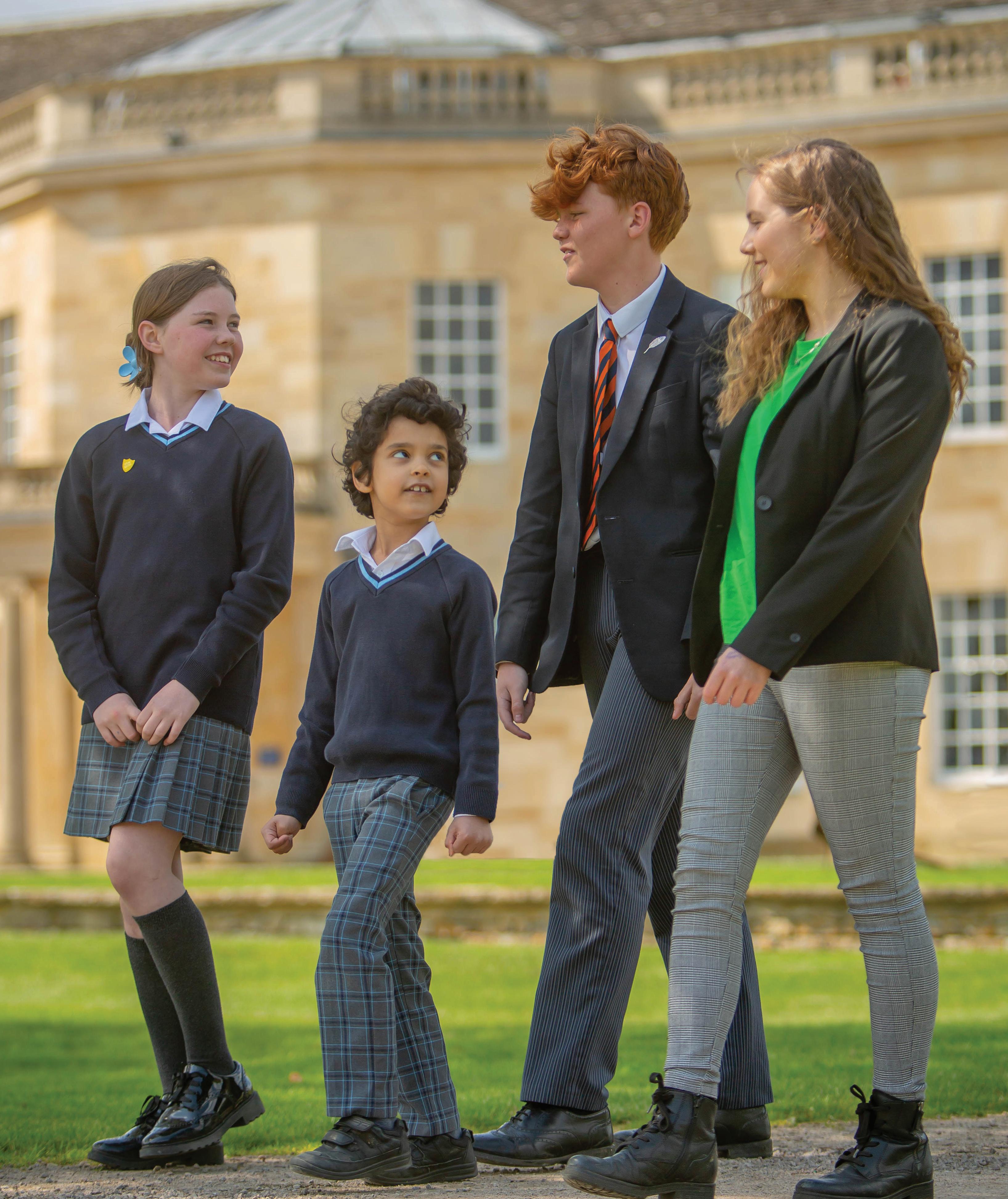
T H E
Front cover image: (left to right) Isabelle Noon (Year 6, Baker), Leonardo De Silva (Year 2, Lockwood), Callum Costley (Third Form, Feilden), Grace Gunn (Lower Sixth, Gascoigne)
Inside front cover: Photography AOB - Frankie Kupce (Third Form, Gascoigne)
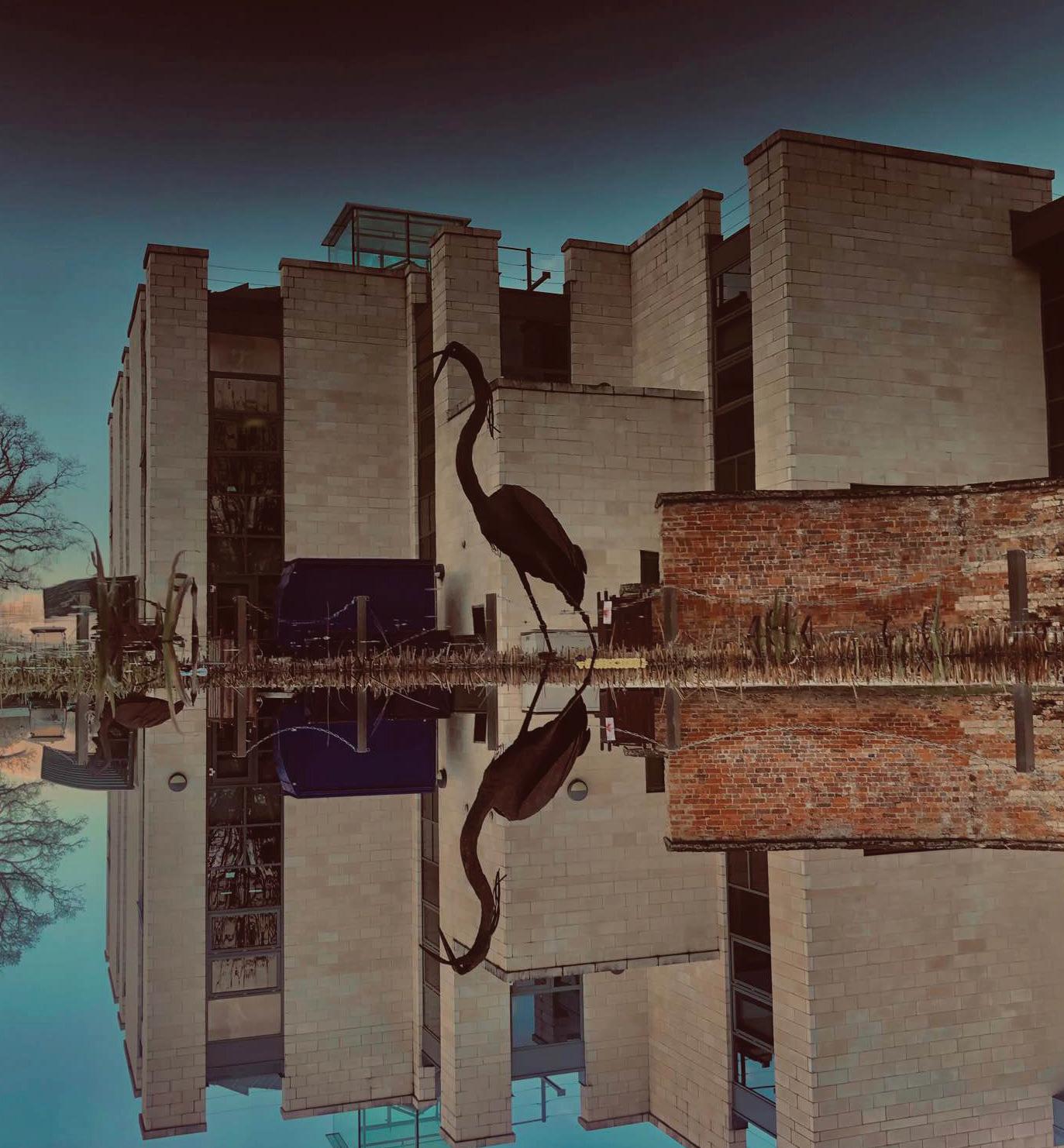
Cokethorpe School
Witney, Oxon
OX29 7PU
Tel: 01993 703921 | Email: admin@cokethorpe.org
Ocellus Issue 50 | Summer 2023
Editor: Mrs L Williams (Communications Officer)
Design and Layout: Mr N Brownless (Creative Officer)
Published by Cokethorpe School.
In this issue...
Stepping Up: life in and after Sixth Form
Pages 2-4
Transition to Senior School
Pages 20-21
Introduction to Cokethorpe Society
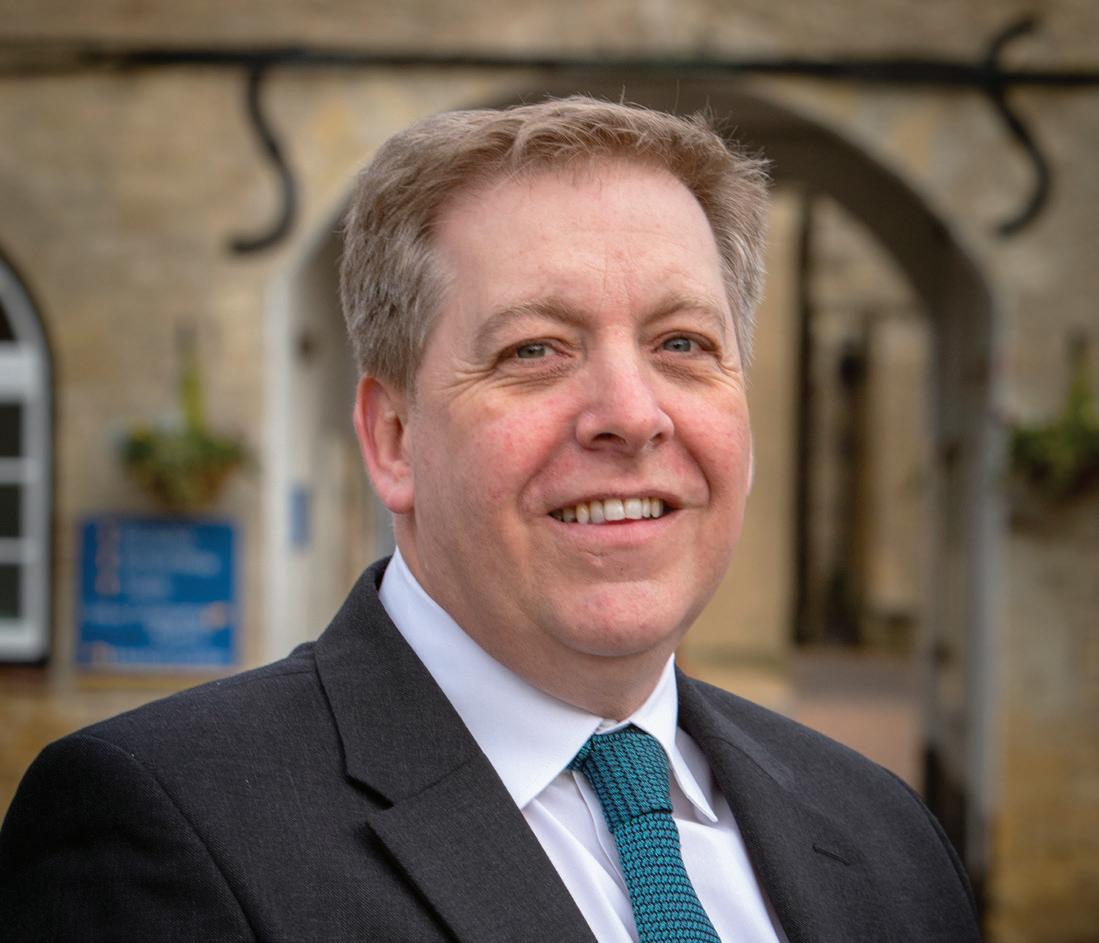

Page 22
50 Issues of the Ocellus
Page 26
‘To boldly go...’
When speaking to university students in 1962, American President John F Kennedy said, ‘We choose to go to the Moon... We choose to go to the Moon in this decade and do the other things, not because they are easy, but because they are hard; because that goal will serve to... measure the best of our energies and skills, because that challenge is one that we are willing to accept...’
...and we know that, just over seven years later, Neil Armstrong became the first person to walk on the moon’s surface. It is sometimes added that this was achieved using a computer with about as much ‘oomph’ as a smart lightbulb!
What does this achievement tell us? It speaks of human ingenuity, when properly harnessed. It speaks to the ability of human beings to have vision beyond the limits of what seems possible. It speaks of courage, because this crew, like others before and since, knew the dangers they were embracing. But perhaps most of all, it is summed up when President Kennedy expressed it as a goal not limited by what can be easily achieved, it was a goal embraced specifically because it was hard.
This was not a pathway purely for astronauts and rocket scientists. Kennedy was seeking to inspire a generation of young people – writers and artists, engineers and architects, educators and peace-makers – to be impatient with accepting soft limits on what they were able to accomplish. Lots of people do, in the end, settle into a pattern of doing what comes easily. I do not think we should judge that choice too harshly. Life can impose pressures and responsibilities that consume our energies. But energy and ambition can be at their most creative and their most unrestrained in young people, and it would be a waste not to exploit them when they are at their most potent.
The example of the moon landing does raise the question of what comes after. There are those who look back on that achievement and ask about the purpose, what positive benefits have resulted? It will always be the case that initial drive and risk-taking need to be sustained by people willing to put in the hard graft that ensures the benefits. Kennedy also said, ‘We set sail on this new sea because there is new knowledge to be gained, and new rights to be won, and they must be won and used for the progress of all people’.
People with vision, often risk-takers, strive to push back the frontiers and dismantle artificial barriers. We should try to find that spirit within ourselves, but always with the hope that it is an expression of something more than vanity.
1
Headmaster’s Welcome
What marks out Sixth Form as a step up from the GCSE years?
I would define it as a development from what pupils experience further down the Senior School. For me to sit here and say that Sixth Form is all about leadership, taking responsibility, being independent, and being motivated begs the question ‘well why is that not the case lower down the School?’ And the answer is, of course it is.
However, because by the time the students are in the Sixth Form they have an eye on the window at the end of the corridor, there is much more of an onus on drilling down into those skills and qualities they need for life beyond school, rather than more particularly those which enable them to be a success whilst at school. By this, I mean the practical manifestations of leadership – I will regularly pop into the Sixth Form Centre to ask for their input; their ideas on something, how this or that could be better, their assistance with running an event, and so on. Leadership
STEPPING UP: life in and after Sixth Form
The move to Sixth Form is commonly recognised as one of the more significant transitions in a child’s educational development. Head of Sixth Form, Mr Tolputt, discusses how the School supports and guides pupils as they take this step.

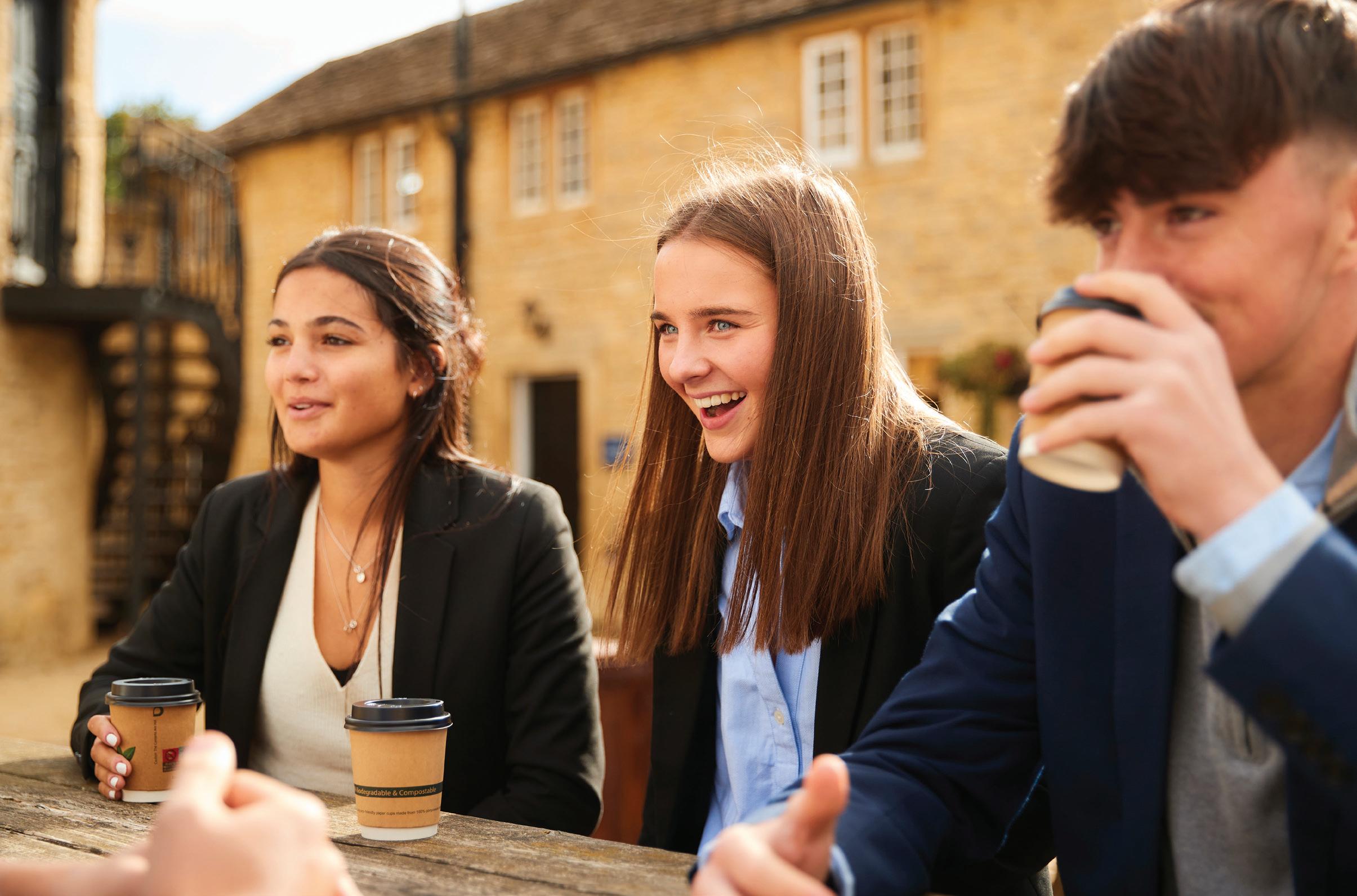
at Cokethorpe is something that is seen everywhere; it just takes on a different flavour in Sixth Form. The students are required to run social events, to give talks for those who wish to do so, and to give time to charity –we have just embarked upon a relationship with Helen and Douglas House which will be entirely led by members of the Sixth Form, for instance. Whatever their expertise, we emphasise that it is no longer enough to be really good at singing or at hockey, we ask them to consider what benefit that gives to the wider School community, and how are they going to support younger pupils in that field?
One of the reasons for setting up the Tutor Partnering programme was to create direct channels between students in the Sixth Form and pupils in the younger years, and to promote opportunities for guidance and inspiration. Members of the Sixth Form support AOBs, they help out with Prep School discos, and so on. Further afield, they lead sport activities at local primary schools and
give academic mentoring to pupils around the country via the Colet Mentoring scheme. They have a responsibility beyond themselves.
That also speaks to the pedagogical approach, it is more discursive than learn by rote.
Absolutely. Indeed, I think that would be the first thing you notice in that development from Fifth Form, you will go into lessons and you will feel that it is all a bit different. The approach has more in keeping with a university seminar than it does with, say, a Second Form Physics lesson. There is a teacher who is coordinating a conversation and it is harder to tell who is really leading the discussion. The dynamic will be more ‘guide at the side’ than ‘sage on the stage’. Teachers become mentors, and the structure of engagements between teachers and students becomes less hierarchical.
I also think it is important for Sixth Form development that students are able to make controlled mistakes, and to, temporarily, get their work/life balance wrong on the grounds that this is an important life lesson. Come the internal exams at the end of the Michaelmas Term, if they have not adhered to the guidance along the way, the results will likely not be what they had hoped for, so we sit down and agree that we need to change the approach. That way, come the end of Sixth Form, they will leave us not only with excellent A Level or BTEC results, but will have learnt that understanding how you work, and learning how to manage your time and your priorities are all very important and easy to get wrong. I try and find that sweet spot between ensuring the students feel supported and guided whilst at the same time making sure they are given the flexibility and freedom to, a) fail, in a way that does not have any long-term impact. And b) develop self-reliance, independence, and resilience.
Looking at Sixth Form life more broadly, you can see the examples of this ownership and sense of personal responsibility playing out in the numbers of students making use of the shuttle bus into Witney at lunchtimes. If we had got this wrong, you might see two-thirds of the year group queueing up, as it is, although a healthy number of students are making use of the option, it is not the same students each time, and we are managing it with one large minibus. That is a healthy sign of a work/life balance operating harmoniously.
How is this reflected in the tutor-student relationship?
Students need as much support in the Sixth Form as they did previously, but it is a different kind of support. It allows students to maintain ownership, being helped to make the right decisions rather than having more of those decisions made for them. However, even with this new emphasis, our three-member Sixth Form staff team and our specialist Sixth Form tutors meet with pupils twice a day and are the first point of contact for students and their parents.
What do we do in younger year groups to ease that transition to Sixth Form?
There is a degree of change that naturally happens once pupils enter the Fifth Form. They have their GCSEs at the end of the year, with coursework along the way in some cases, and they learn quickly that they have total control over their results in the summer. It is an opportunity to take a more active role in leadership through learning to lead themselves: who do I work best with, where do I work most effectively, which study methods work best for me.

Added to that, the pupils in the Fifth Form will begin thinking about the next rung in the Scholarships and Awards process for the Sixth Form, throughout which there is a strong emphasis on Leadership (plus, of course, thinking ahead to the dedicated Leadership Grants for when they are in the Lower Sixth). They will also start to hear more regularly from me about School life beyond the GCSEs; for example, we have the Sixth Form Preview Evening during the Michaelmas Term of Fifth
Form, which supports the process of Sixth Form subject choice, whilst encouraging the pupils to consider the wider Sixth Form experience.
Of course, many of these engagements start much earlier. The careers journey at Cokethorpe is a bit like the source of the River Thames in so far as it begins further back than some might think. Our Head of Careers begins working with pupils in Second Form with aspiration testing – a process which continues each year as the pupils progress up the Senior School. Goal setting sessions begin, helping the pupils start to think about their future options and that they are giving due consideration to the suitability of the subject choices they make at GCSE for their desired path. One-to-one careers interviews take place in the Third and Fifth Forms to bed down those thought processes on subjects for GCSE and A Level choices respectively. These are supplemented by workshops and lectures all tailored to helping them feel informed about the decisions they will be making.
3
It is a relatively young age to be making choices which have an ultimate bearing on their lives and it is crucially important, therefore, that we support pupils through our Careers Service, as well as through their Tutors, their Housemasters and Housemistresses, and their teachers from really the Third and Fourth Forms. Once they are on that two-year GCSE pathway, their journey has already begun. It is significant that they get that right and we ensure they feel supported in making those selections that are best for them and what they want to accomplish. We make that commitment of support to those pupils who join us from outside the School to start the GCSE years as well.
The Cokethorpe Diploma in the First and Second Forms, and the Second Form independent research project provide early opportunities to begin engaging with and honing those skills necessary for life in Sixth Form at Cokethorpe.


Looking to Sixth Form again, there are lots of programmes at Cokethorpe to aid students’ preparedness for life after school. There are the soft skills or qualities that are taught everywhere, but we also have dedicated programmes in place that push beyond some of those behavioural tropes. The Sixth Form Skills programme includes interview technique sessions, public speaking workshops, cooking, managing budgets and finances, study skills, and so on. There is also the Extended Project Qualification (EPQ) that many of our students opt to take, which is an extraordinary option in terms of
acquiring skills. They go off to university or the workplace having done a really significant and meaningful research project, touching on things such as time management.
We also have the Electives programme. This runs for an hour per week for ten weeks each term, throughout the Lower Sixth year. The purpose of this programme is to encourage a joy of learning for learning’s sake. The students sign up to three electives, which are each run by a member of staff who is sharing a passion for a subject matter beyond that which they teach or is part of the curriculum. I try and encourage the students to explore electives that are totally separate from their A Level or BTEC choices.
Where do our students go from Sixth Form and how do we support them in getting there?
They go to a variety of selective institutions, they go to Russell Group universities, they go to Oxbridge. Others opt to take Degree Apprenticeships with some of the biggest names around – Rolls Royce and JCB, for example. What we are finding more and more is that a good outcome is one that fits the student rather than the traditional ‘rankings’ in terms of where those opportunities sit. We are not unique in this; having been to a UCAS conference recently, you hear more and more examples of this. There was a speaker who had five offers from universities, including from Cambridge, but wanted to pursue a Degree Apprenticeship and had to apply widely to find one. It turns on its head some of those old assumptions that the highest competition for places is at the best higher education establishments. Our job is to make students aware of their options and to support them to think of themselves in the middle of this decision. A prospectus does not show you the full picture, and we have to support the student to look, not at which is better A, B, or C, but which is better for me and what I want to do longer term. We are fortunate in having a next-steps programme that is as suited to supporting a student towards a Degree Apprenticeship with IBM, for instance, as it is a student preparing to apply for Natural Sciences at Cambridge.
Mr Tolputt was speaking to Head of Marketing, Mr Griffiths.
What
do you
do at the School?
Head of Prep School Maths and a Year 5 Class Teacher.
When did you join?
September 2021.
Tell us about some of the initiatives you have implemented since joining?

Those that know me will know that I have a passion for maths, and I was delighted to be appointed to lead Maths in the Prep School. As teachers, we are in the privileged position of working with young, malleable minds and, in the Prep School, we have built a culture in which pupils look forward to Maths lessons; they are curious and have opportunities to take risks, exploring the ‘why’ of mathematics, as well as the ‘how’. Our Maths lessons incorporate creativity, alive with the buzz of maths talk and discussion; children ask ‘what if’ questions, discover patterns and make connections for themselves. Of course, they learn the fundamentals, the foundations of mathematics, but it is the way in which this is taught that is so crucial. The focus has become two-fold; yes, attainment has been raised and this is measurable but, equally importantly, pupils are more confident and now see maths as exciting, something at which they can succeed and become engrossed in.

Parental engagement with a child’s learning is key, so I have run a Parent Workshop, outlining the way in which maths is taught at this stage. This has enabled parents to actively support their children with homework, consolidating that which has been learned in class. I have also begun Further Maths lessons for some of our most able mathematicians, covering topics such as binary, Pascal’s Triangle and the Sierpinski Triangle. Of course, we will continue to strive to improve, but we are certainly on the right trajectory.
Your association with the School precedes your working here. What was your children’s experience of being here?
We feel very fortunate that our children were part of the Cokethorpe family. My daughter started at the Senior School in September 2013 and my son two years later, having both attended a local primary school. It may sound like a cliché, but from the moment we stepped through the door, we knew it was where we wanted our children to be. During the nine years that followed, they both thrived, receiving the perfect balance of academic rigour and nurture. Both were Academic Scholars, enabling doors to be opened for them in terms of enrichment opportunities – cultural, academic and musical. Individual Focus and Exceptional Breadth, certainly.
What are they doing now?
Katie is nearing the end of her second year at Durham University, where she is reading Liberal Arts. She is studying English and French and will spend next year studying at the University of Toulouse, before returning to Durham for her final year. Harrison is in his first year at Southampton University, studying for a five-year MEng in Aerospace and Aeronautical Engineering; with an industrial placement year.
Did that influence you to join?
It certainly did! My daughter, Katie, worked in the Prep School during her gap year and absolutely loved it. She would return home from work every day, simply buzzing with all that had happened in the day. A vacancy came up in the Prep School and I had no hesitation in applying; I am so glad I did.
Anything else you would like to add?
I was recently nominated by Mrs Black, Head of Prep School, for the Tes Primary Curriculum Leader of the Year Award, and am delighted to have been shortlisted, along with five other candidates nationally. The Awards Ceremony will take place later this term. Irrespective of the outcome, I feel honoured to have been shortlisted for this prestigious award, not least because it will champion the importance of maths.
MEET THE SCHOOL: MRS PROCTER
COKETHORPE CREATIVITY - DT
I am currently an Upper Sixth student, studying Maths, Physics, Design and Technology, and an EPQ, with a goal of undertaking a mechanical engineering degree (MEng) at the University of Southampton. The following project is worth 50% of the marks in my Design and Technology A Level.
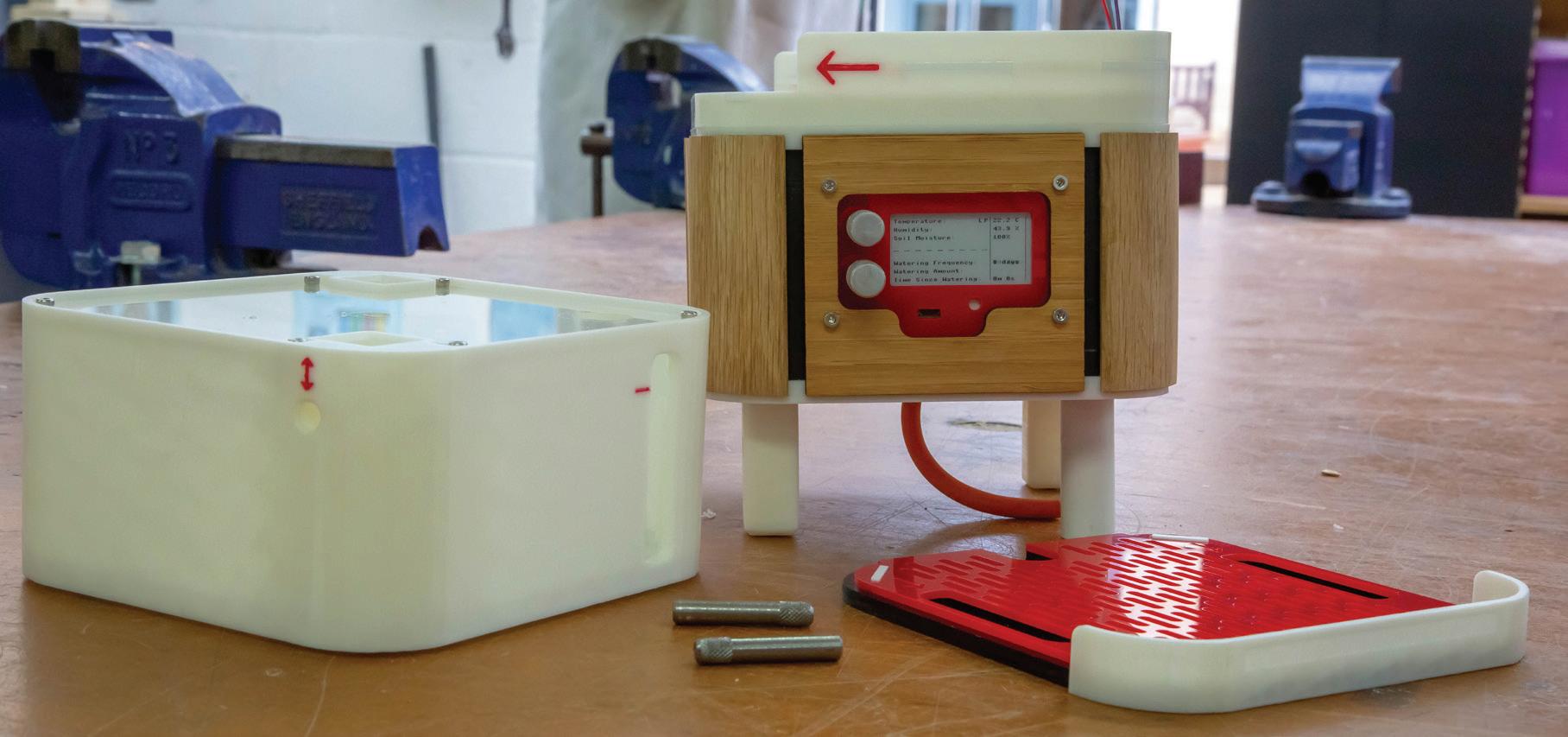
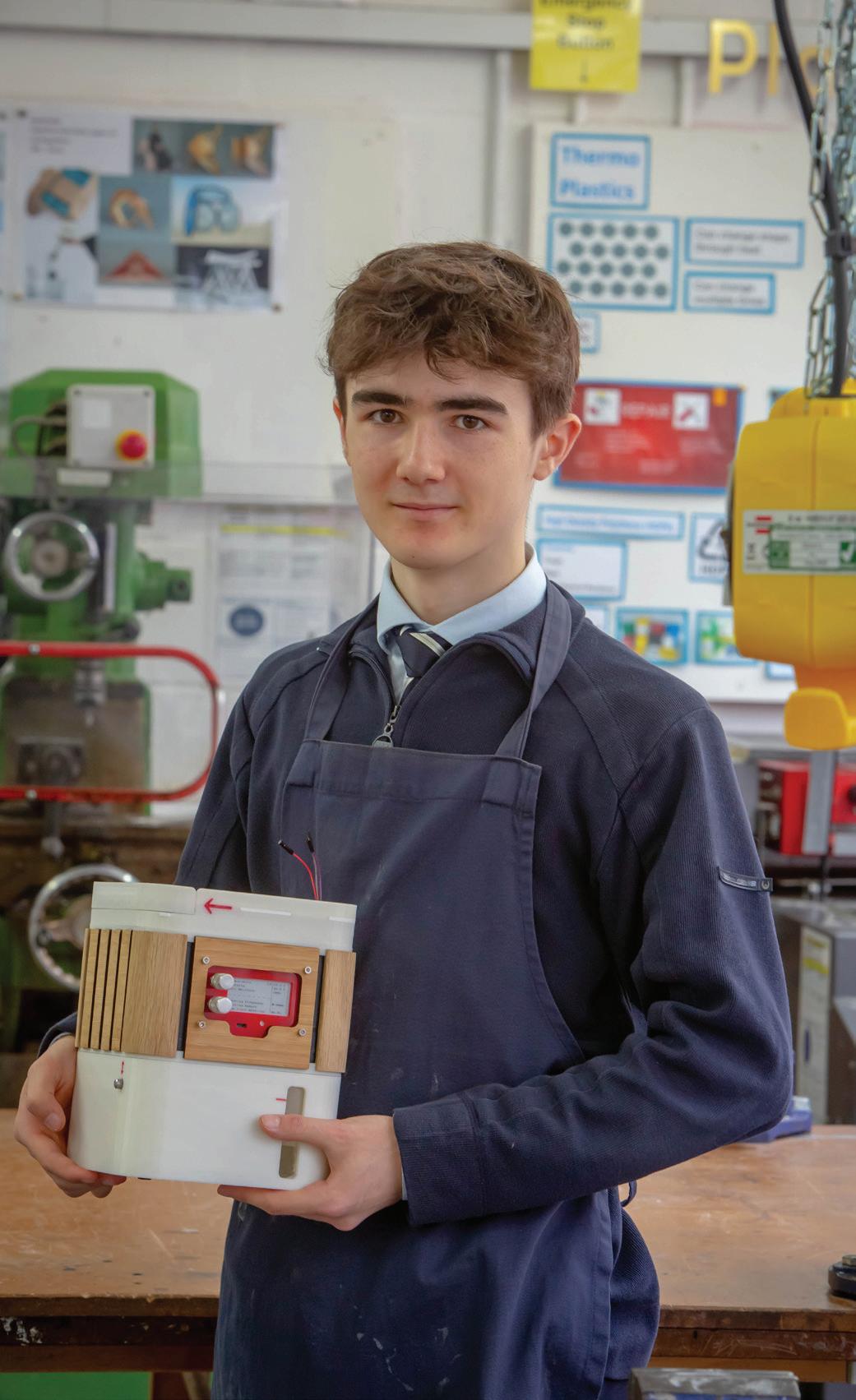
As a Non-Exam Assessment (NEA), I have worked on this piece of coursework over the previous year, while simultaneously building my technical knowledge during our design theory lessons. Completing the NEA to a high quality enables you to display and use the skills you have learnt in the course, while securing a large chunk of the available marks before public exams. At GCSE, this process is guided by supplied topics and themes, however, there are no limitations to possible A Level projects.
To succeed, you must first find a client, identify an issue that they face and then develop a design possibility that meets the needs outlined by your research and specification.
My client struggled to water her plants within multiple separate office locations. Although solutions existed, none were suited for her use case, as the rooms would be left for periods greater than is supported by existing products. Moreover, the aesthetics of the product were a key consideration for my client. Due to limitations in the office’s leases, none of the spaces could be permanently changed. This ruled out any wall mounted designs.
Through guidance from my client and market research, I developed this design possibility further, progressing to sketching, modelling, and the eventual final design which can be seen in the images.
My final design is a modular system with a central hub and watering reservoir. This allows the end user to buy a single ‘main’ unit that can then be used to support multiple different plants. The drainage system for the plant is built in, therefore there are no unpleasant plates holding stale water beneath plant pots. Since each section is connected using magnetically held locking pins, the whole stack can be quickly assembled in less than fifteen seconds.

To control the product’s functions, I designed the low-power monitoring system around a Pi Pico microcontroller and series of sensors. This enables the product to control water delivery via a pump. By collecting data such as temperature and soil moisture from the sensors, the user can set thresholds for the watering frequency and amount. This prevents accidental over or under-watering, while still allowing the sensors to inform the watering decisions.

Since my client stipulated that the product had to meet the aesthetic standards of her office, trailing wires were not an option. To ensure that the design could run without intervention, I used a combination of deep-sleep states and an E-ink display, which holds its image without power. This allows the device to function for close to five months without charging. Furthermore, an onboard charging module allows an optional solar panel to be connected. This makes the entire system self-sustaining (aside from re-filling with water).
To construct the prototype, I created a full CAD (Computer Aided Design) model using a combination of Solidworks and Fusion 360. This involved features such as: part connections, tolerances, material details and appearances. By creating such a detailed CAD model, I was able to quickly complete a series of complex tasks, including:
• Generating full technical drawings to meet BSI standards

• Validating the product’s function with both thermal and stress simulations (Ansys)
• Creating photo-realistic renders in Blender
• Preparing DXFs and STLs for 3D printing (Cura).
Aside from printing and laser-cutting parts, I also shaped oak corner slats using a hand plane and turned the steel knobs and locking pins on a lathe.
I would recommend Design and Technology A Level to anyone interested.
By Lucas Bennett (Upper Sixth, Queen Anne)
A LEVEL AND GCSE DT PROJECTS
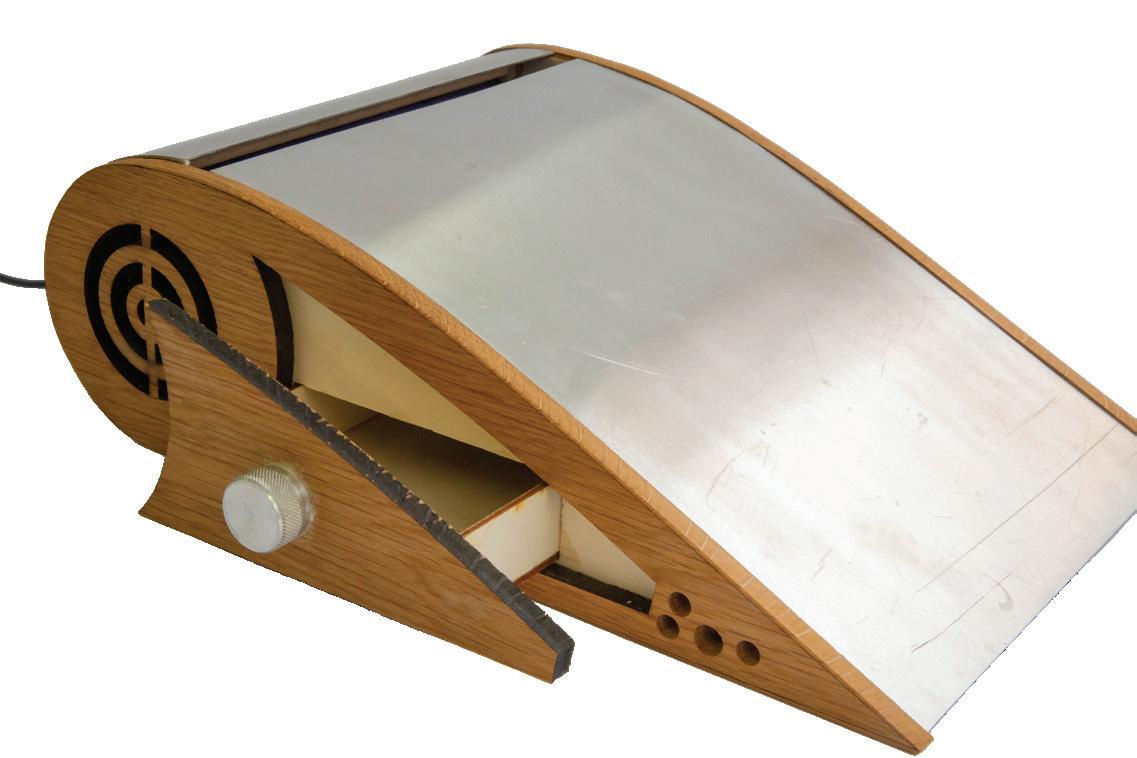

The Non-Examined Assessment forms a significant part of the Design and Technology course at both GCSE and A Level, providing pupils the opportunity to showcase their skills solving real-world problems. Below is a selection of the pieces from this year’s projects, including lamps and speakers, designed to fulfill specific client-led purposes.

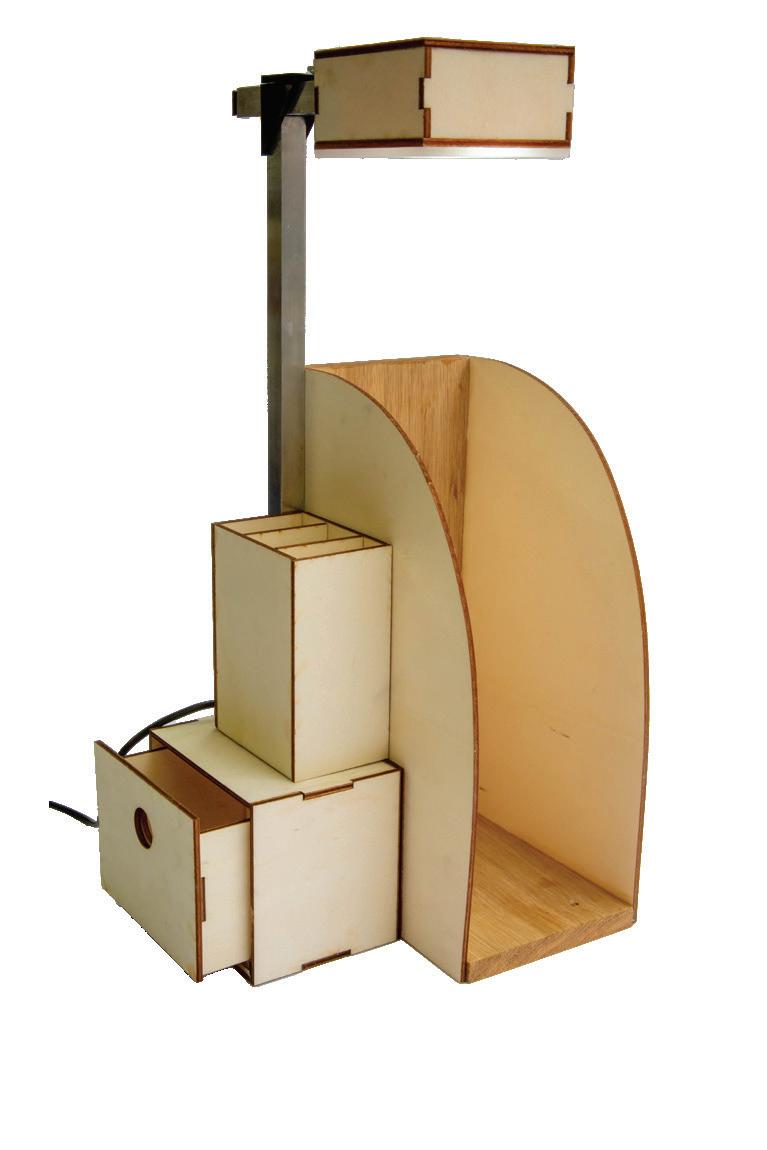
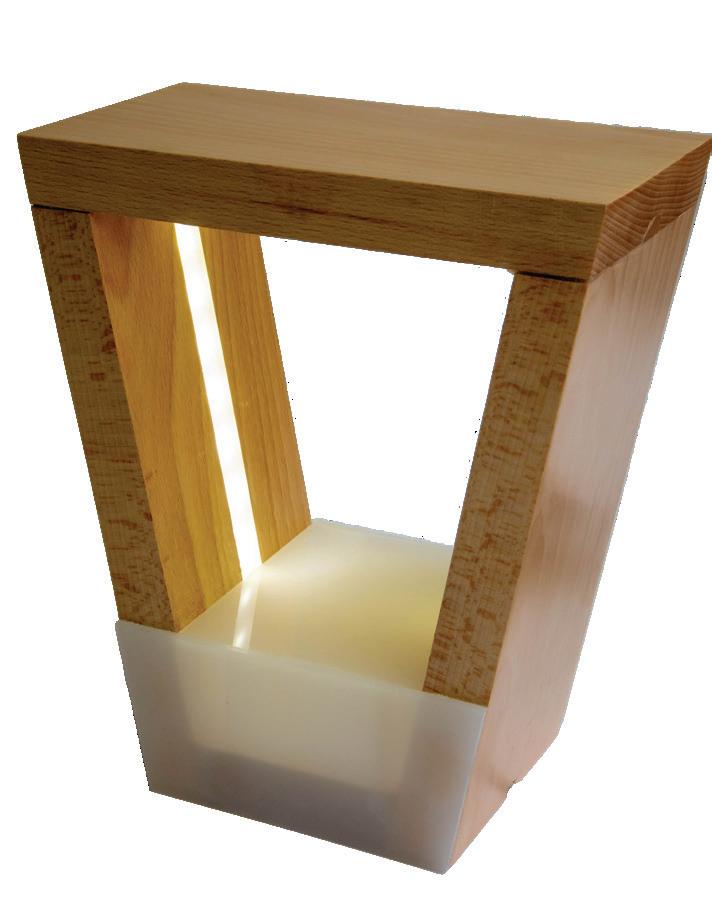

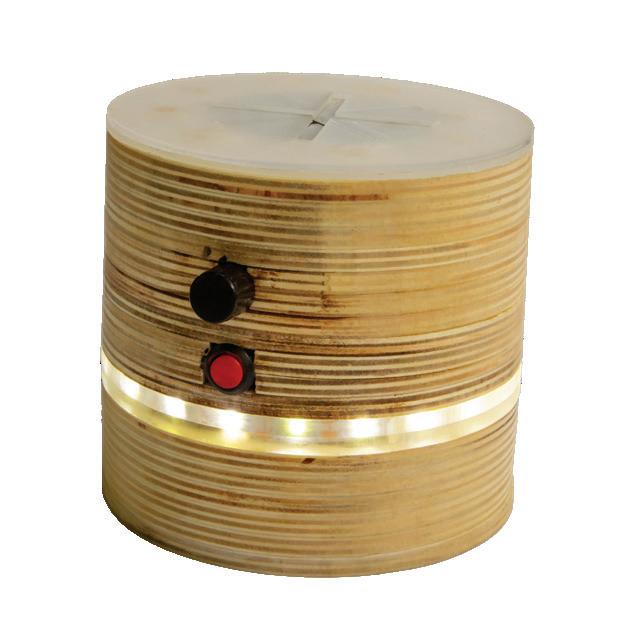



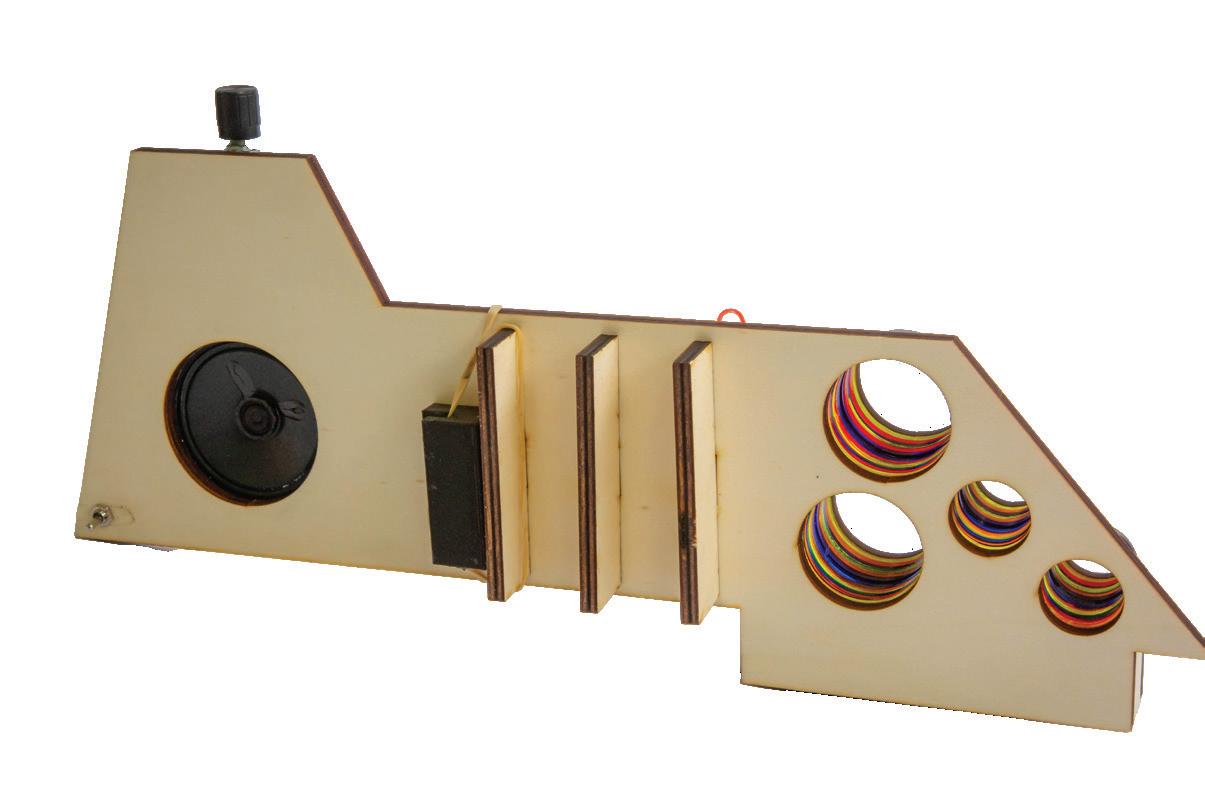
7
Adam North (Fifth Form, Queen Anne) Kit Baxter (Upper Sixth, Vanbrugh)
Sam Phelps (Upper Sixth, Feilden)
(Fifth Form, Gascoigne)
(Fifth Form, Queen Anne)
Finley Gregory-Newman (Fifth Form, Queen Anne)
Freddy Masters (Fifth Form, Harcourt)
George Keates (Fifth Form, Vanbrugh)
Will Taylor (Fifth Form, Swift)
Edward Cale (Fifth Form, Gascoigne)
George Campling (Fifth Form, Feilden)
ACADEMIC SHOWCASE
Two Distraught Souls
By Christian Lim (Fifth Form, Harcourt)
He stares into the blackened skies, wondering about the gateway. His failing mind cannot comfort the burden of gathered time. He will break. Alone. And apart.
He thinks of her - his decision. Unregretful. Mourning. Fidgeting a guilty knife through his fingers. Then unbeknownst, he met a hand.
She lingered beside him - a ghost. Persisted. Deluded. Phased in every sense. Her hope yearned for a brighter end: unextinguished, unmet.
She stared into his yearning eyes, frightened by the gateway. Her frail mind could not bear the haul of gathered time. She will break. They will shatter. Together. And apart.
The Numbers
By Jack Bayliss (Second Form, Gascoigne)
I sat down. My head pounding. All I could see were the same few numbers. I turned left to right; all I could see were numbers, as if computer codes. My head was pounding as if something was trying to get out. Everything in my room was a number. Everything in my head was numbers. Then it stopped.
The pain.
The numbers.
All stopped. That’s when I heard a jarring noise to the right of me. A rattling noise that came from the door. The light suddenly turned off. The door broke open, and the creature came in.
Two Horns
By Oscar Luckett (Fifth
Form, Vanbrugh)
Two horns curled from the bone mask that adorned his face. Black tar seeped from the cracks where the man had joined the fractures of bone together, it seemed as if the skull were bleeding black blood. Through the empty sockets of the ram skull mask, you could see the scar tissue surrounding the place where his eyes once were. In their place, an empty socket, wet with blood, and the red and white remains of the other. He stared down at the man lying on the floor beneath him, he sighed, raised his flail, and brought it crashing down.
The Void
By Sophie Sharp (Third Form, Vanbrugh)
Like a bottomless pit full of memories, That will never be forgotten. Like a seat next to me, That no one wants to sit in. Like the person smiling cheerfully, That I can only see in pictures. Like the countless videos and recordings, With the voice that no longer exists. Like the dark, empty bedroom, With the hollow space inside. I fall further and further, Into the empty void that I call loss.
She Saw
By Stella Willis-Bund (Fourth Form, Feilden)
The quick remarks, the rolling eyes
The skirt that’s far too short She may no longer care, but nonetheless, she saw
The hurtful jokes, the shaking fists ‘she’s a feminist, of course’ She may no longer cry, but nonetheless, she saw
The beating, the targeting, Assault and tears and more, She may no longer scream, but nonetheless, she saw.
Traveling Down a Deep Dark Cave
By Jack Bayliss (Second Form, Gascoigne)
Traveling down a deep dark cave
A candle to light the way
But there are rumours of a beast that keeps Others at bay
So deeper and deeper I go
Traveling down the deep black cave
For there is someone I must save But the adventure is too dangerous and It keeps others at bay
So deeper and deeper and deeper I go
Traveling down the deep black cave
For there is someone I must save But the candlelight is getting dim and the Light it produces is very thin
So deeper and deeper and deeper and deeper I go
Traveling down the deep black cave
For there is someone I must save
But the candlelight is gone and I wander without clue
And I am starting to wander what to do
So deeper and deeper I go
As the roar of the beast draws near
As I fail my attempt to stay clear
So deeper I go
Tripping and fumbling down the Deep dark cave
The pounding of the beasts footsteps
Grows louder and louder
So deeper and deeper I go
Running down the deep dark cave
The beast has caught up with me
I realise my fate for eternity
So I stop
I turn around to face the beast
Knowing that I am going to be a feast
The beast slows down And approaches me
With morbid curiosity
Its weapon raised high
And I look at it with a sigh
A horrifically loud bang goes off
A sharp pain goes through my body
And I fall down to the floor
But the pain is replaced with joy
As I see the child scamper away
To live for another day.
Ancient Greek AOB Translation
Greek Junior Dialogue Euripides, Electra 223–34

λ. καὶ πῶς ξιφήρης πρὸς δόμοις λοχᾷς ἐμοῖς;
ἐρεῖς
Ἠλ. ἕστηκα: πάντως δ᾽ εἰμὶ σή: κρείσσων γὰρ εἶ.
Ὀρ ἥκω φέρων σοι σοῦ κασιγνήτου λόγους
Ἠλ. ὦ φίλτατ᾽, ἆρα ζῶντος ἢ τεθνηκότος;
Ὀρ. ζῇ: πρῶτα γάρ σοι τἀγάθ᾽ ἀγγέλλειν θέλω.
Ἠλ. εὐδαιμονοίης, μισθὸν ἡδίστων λόγων
Ὀρ κοινῇ δίδωμι τοῦτο νῷν ἀμφοῖν ἔχειν
Ἠλ. ποῦ γῆς ὁ τλήμων τλήμονας φυγὰς ἔχων;
οὐχ ἕνα νομίζων φθείρεται πόλεως νόμον.
ELEKTRA Let go. Do not touch what is not right for you to touch!
ORESTES There’s no one else that I could touch with greater right.
ELEKTRA So why then wait by my house with sword in hand?
ORESTES Stay and hear what I have to say and you will understand me.
ELEKTRA All right. I shall stay. For you are far stronger than I am.
ORESTES I’ve come with news about your brother.
ELEKTRA Oh, dear friend, is he alive or dead?
ORESTES To tell you the good news first - he lives!
ELEKTRA Bless you for your sweet words.
ORESTES May we both be blessed.
ELEKTRA In what bitter exile is the poor man wandering?
ORESTES He’s a lost soul, wandering from one city to the next.
Ἠλ. ἄπελθε, μὴ ψαῦ᾽ ὧν σε μὴ ψαύειν χρεών Ὀρ οὐκ ἔσθ᾽ ὅτου θίγοιμ ᾽ ἂν ἐνδικώτερον Ἠ
Ὀ
ρ. μείνασ᾽ ἄκουσον, καὶ τάχ᾽ οὐκ ἄλλως
Ὀρ.
First Form Published Articles

The First Form pupils recently completed a non-fiction project exploring issues of endangerment amongst British wildlife. As part of the project, pupils were invited to write to their village magazines expressing their views about our wildlife and advising how individuals can help to protect our species. Pupils have enjoyed seeing their work in print and some have gone on to write further letters and articles about issues that arise at local levels such as road safety. It is wonderful to see our young people finding their voice beyond the school gates.
Help the Hedgehogs
By Jessica Lewis (First Form, Swift)
I am Jessica Lewis. I have been living in Kingston Bagpuize for about eleven years now and we (being my family and I) used to see hedgehogs in our garden and now we hardly see them anymore. Therefore, as part of my English lessons at School I am writing to you, the population of Kingston Bagpuize with Southmoor, about ways you and I can help. The hedgehogs are a beloved creature, and everyone can find something to love about them. But they have been decreasing in numbers over the past few years and things that we, as villages and as part of England and the UK, we need to do something. I, however, have a few solutions for us as a community to try and hopefully help the little bundles of joy that I hope we can soon see again in and about our villages!
One way you can help hedgehogs in your very own garden is by making a hedgehog highway. This is done by just making sure you make a cut in your fence (the cut should be sort of like a tunnel) to allow the hedgehogs to run freely around your garden and around the community. Another way to help our little prickly friends; is by given them a comfortable and homely place in your garden for them to rest. I think a good name for this is a hedgehog house, I also believe that a hedgehog house in the Millennium Green would help with increasing the hedgehog population. Things that you can put in a homely place for them are leaves, brushwood and other things for them to make a nest with.
Another way for us as a community, or individually, to do in your garden is feed the hedgehogs; if you notice hedgehogs are in your garden feed them. If you are wondering what you could feed them with, they like things such as tinned dog or cat food. Boiled eggs and meat are a good main meal and for a little treat you can give them fruits and vegetables.
The hedgehogs travel at night as they are nocturnal and this is a real danger for them and their population, this is because of road deaths; this is when a hedgehog unfortunately gets hit by a car and killed. There is not much we can do to help this, but you as a driver can help this by driving safely and making sure you don’t kill any hedgehogs: as hard as it might be to avoid this you still need to try your best.
To all of Kingston Bagpuize and Southmoor, I hope you take care of yourselves and the hedgehogs.
Hazel Dormice - How we can help?
By Barney Hope (First Form, Swift)
Hazel dormice are a very fragile species of mammal that are declining massively (the population has declined by 52%) and have been doing so since the year 2000. They have gingery fur and a fluffy tail. They also have black beady eyes. They look very like a mouse, and you also may be thinking they are mice, but they are not. I am very worried that they will become extinct before I become an adult. I am currently in First Form and I have chosen to do a project on the hazel dormice and how we can help.
We are very lucky to be near hazel dormice so we need to look after them. Helping does not take a lot of time and is very easy. Hazel dormice have been going extinct and have been doing so for many years. The reason to their extinction is human activity and climate change. They need natural hedgerow to survive but humans are destroying their habitat. Luckily, the 1000th Hazel Dormouse will be released into the wild soon so there is still a chance.
I have been learning a lot of information from a website called People’s Trust for Endangered species and they have been working on the hazel dormice for many years. They are a very useful company to have and I think they are doing a wonderful thing.
To help them, you can go onto their website and find the right part where you can report a sighting of one. Complete the survey and then that will help them collect more data about the hazel dormouse and it helps them a tonne.
Why not have a simple stroll through the woodlands? You can get loads of fresh air, a brilliant walk and possibly spot some animals you didn’t know existed! Try looking out for hazel dormice or evidence just as small, nibbled nuts or footprints and then report them to The People’s Trust for Endangered species.
Why Wendlebury Needs Speedbumps
By
Freya
Vincent (First Form, Queen Anne) Well, the answer to that question is simple –to make our village safer for all of us. Some residents may know this already, but there has been a growing need for speedbumps that has only been addressed now. This matter should have been dealt with ages ago, therefore I think we need speedbumps.
What Would They Do?
As a student myself, I know that walking along the road to the Red Lion at 6.30 in the morning sounds miserable – make that dark, cold and wet and add 20 impatient cars trying to get past and it becomes a nightmare. This is what I must deal with every morning Monday to Friday, and it can become scary. Especially when you want to shut your eyes so you do not see the crash that nearly happens or after nearly being run over at least once a week.
What Is the Cost and Where Would They Go?
Of course, I cannot determine the exact cost, but it would be around £100 for one rubber speed bump although I do feel that we need two. Before we buy them, we could also take a vote to see how many people truly want them, although I believe they would be extremely beneficial for all residents. If rubber speed bumps do not work, we could always look for tarmac ones but these will cost more. We could have a fundraising event too. Next comes the matter of deciding where they are to go. I propose that we situate them just before the bridge (near the pub) and another one as you come around the corner next to the village hall. These are the places where I feel cars go the fastest, although as they would be rubber, we could move the speedbumps around the village to other areas that need more traffic control.
Who Would They Benefit?
Everyone! Speed bumps would help every resident in Wendlebury. Specifically, the elderly, the vulnerable, children and mothers with small children who struggle to cross the road. They would slow down traffic and maybe even decrease it entirely. Pet owners and their pets will also be safer as well as local wildlife. Plus, our air could be cleaner and fresher because there would be less carbon emissions.
Please Help Us Get Speedbumps!
Now you know how speedbumps will have a positive impact on Wendlebury, I hope that you will vote to introduce them to the village. Speedbumps will have an amazing impact on Wendlebury and our lives.
PREP SCHOOL ACADEMIC WORK
How to Plant a Seed
By Ruby Jennings (Reception Class, Symonds) Soil
Seeds
Watering Can Plant Pot
We put the soil in the plant pot. We put the seeds in the soil. We watered the seeds. We put the plant pots on the window sill.
Fantastic Mr Fox Reward Poster
 By Forest Neal (Year 1, Gwyn)
By Forest Neal (Year 1, Gwyn)
A terrible poultry thief!
He is a sneaky chicken snatcher. Look out for his fluffy ears and his bushy tail. Reward £10,000
Fantastic Mr Fox Book Review
By
Ollie Younger
(Year 1, Symonds)
My favourite part of the story was badger digging the tunnel with the foxes. I liked it when Mister Fox found the food and cider.
The Boy Who Cried Wolf
By Woody Heaton (Year 2, Gwyn)
Long ago, an idiotic shepherd boy was watching his flock of sheep. The rams, ewes and lambs were chomping all day long. The boy was bored so he did a trick on the villagers. He cried “Wolf!” three times. The villagers came but there was no wolf and the sheep were still there. The villagers were so irritated with the boy. They staggered back down the hill with their iron weapons. A ravenous wolf was prowling round the pen. The wolf was planning to pounce at the thought of the nourishing meat of a tender lamb. Then he pounced! The sheep were doomed. They were gobbled up by the wolf, who licked his lupine lips. The boy cried “Wolf!” However not even one villager came. He cried “Wolf!” again, but not even one villager came again because they were not going to be fooled this time. The boy learnt his lesson: don’t lie, as when you do tell the truth, you will not be trusted.
The Flying Machine
By Reggie Firth, (Year 2, Baker)
Ralph and his nightmare monstrous friend Extender Tooth were bored. It was a sunny day, but they were inside building a machine. They hoped it would fly. It was the year 2026. It would fly. They started to rise. Automatically, they were travelling at light speed. The flyers went up and up! Panic rushed through their veins. In the blink of an eye, they were too close to the sun, they had a lack of sight and felt numb. The travellers accidentally sat on the deactivation button. Since the mischievous two were just above the balmy, scolding sun they got badly singed! The intelligent machine sensed the heat and flew off again at an extreme pace. It was a close shave. Risky, but good fun. When they got home, the travellers had a phenomenally good hot chocolate and relaxed afterwards. They wondered what their next epic adventure would be about. After all, they had already had quite a safe adventure –or had they?
Alliterative Tongue Twisters
By Leonardo De Silva (Year 2, Lockwood)
Wilbur wept woefully wondering where Witney was Energetic Etta edits her English efficiently
Urgently, the unfamiliar unicorn upgraded his ugly uniform Leonardo loves to live like a loyal lion
Zoe zipped zigzagonally on her zealous zebra
Lorenzo lunged lengthily like a lovable Labrador
A new chapter of ‘The Last Bear’
By Starla Firth (Year 3, Lockwood)
April opened her window wide. “Meet me at the bay tomorrow,” she called to the wilderness. She waited for Bear to reply and then there it was, the safe, calm roar of her best friend Bear.
The next day, she got up at 4am and she wrote a letter to Dad saying, “I have gone to save Bear. PS do not follow, this is my job. Love, me.” She fetched her bag and set off to Walrus Bay. Five minutes later, with her back throbbing and her palms sweating, she arrived at Walrus Bay. She loaded up the canoe and April pushed it to the edge of the beach.
Bear clambered into the canoe then April leapt in as it bobbed away into the unknown. Five minutes later, April woke up with a start. They were going on a roller coaster. She popped her head out of the trapdoor. There were colossal waves towering above them, waves thumped against the minuscule boat but only when it could not get worse, a blue ringed octopus was squeezing in through a gap in the canoe.
April huddled against Bear’s soft, thick fur as it squirmed towards them. It was shrieking and wailing when a colossal wave plummeted down on them, dragging the octopus away. When they thought it was going to be alright, they heard a sound that sounded like splintering wood and before they knew what was happening, the boat split in two and catapulted April out into the ocean.
The Vikings Raid Lindisfarne
By Sophie Campbell (Year 3, Baker)
Long ago, in 793AD, monks were praying, farming, eating and living peacefully at their monastery in Lindisfarne. Then, the bell rang as some shadows of boats appeared in the distance. They went running into a safe vault and prayed to God. The Vikings landed at Lindisfarne, broke in and looked everywhere. They could hear the sound of monks praying in the vault. The Vikings managed to break in and sadly killed them. They took treasures, the monastery and the land and for the Vikings, it was a happy ever after, but for the monks, not really.
VIKINGS
By George Theyer (Year 3, Symonds)
Victorious men
Invading villages
Kings that are really deadly
Incredible fighters
Noisy!
Giant ships that sailed over seas
Stop making a noise!
Our Beautiful Nature
By Julia Pisanello (Year 4, Baker)
Nature, nature
Is there anything more beautiful? Daisies, bluebells Snowdrops and roses too!
First comes Autumn, His amber leaves kissing the ground. Then the cold Winter Paints the bare trees white. Spring follows, as sweet as a cherry, With her tulips and new born animals. Then there’s the splendidly sunny Summer, Giving us peaches and watermelons.
Nature, nature, Look after her like she does to us. Look up to our mother with all your heart. She is there for you.
I Will Publish My Story, inspired by Frost Hallow Hall
By Imogen Jones (Year 5, Baker)
“We’re here.”
about what would happen.
The water was a sparkling turquoise with a sky of clear azure. Wasn’t this incredible?
They were soaring near the clouds; it was exhilarating! Magical!
The boat was carving through the collection of crashing waves. This was bliss!
The Chase
By Tamsin Pratt (Year 6, Lockwood)
One cold, breezy night, Moll, a thief, had a mischievous idea to steal food and precious jewels from the King. She knew that it would be a challenge, but she was sly and smart and had made it past the strong guards before.
Once her clock hit pm, she hopped the mossy wall and crept past the sleepy guards, her long hair swaying in the breeze. As soon as she got to the grand doors, she heard footsteps, gradually getting louder, and louder. Moll hid behind a nearby bush and saw another way in. She checked if the servant was coming. Then made a run for it.
Will Potter’s smug voice was all I could hear in this solitary place
The frosty grass rustled beneath my feet. The skates were wonderful things; part wood, part blade. He put on the giant ice-skates (that fit perfectly on his great feet) Without any trouble; Will stepped onto the ice and he was off. He skated cleanly and almost made it look easy. As I was waiting for my stint, I admired the eerie landscape of Frost Hallow Hall. A mysterious fog was drifting about. What’s that? A dark figure loomed through the fir trees. “Your turn, Tilly!” He knocked me out of my daze.
After Will had taken his sweet time getting my boots on, I finally took one courageous step onto the ice and I immediately fell onto my backside. “Nice linens!” Ugh, how he irks me. Then I got the hang of it, dashing past the snow-encrusted trees like a mad thing. “Stay away from the middle!” Will shouted. I didn’t listen. He wasn’t going to ruin my moment; but something else did. The ice groaned beneath my feet and frigid water spewed over my Sunday frock.
Everywhere I turned I saw only darkness, and I could feel the reeds trapping my feet onto the lake floor. My lungs felt as if they were in a vice and I was enveloped in bone-crushing cold.
A strange warm yet solemn light appeared in front of my eyes, and the most beautiful boy took my hand; his face looked desperate and although I could not hear him I could tell he was pleading for something. Did he want my help?
I’m flying like a bird overhead. I see a girl; her lifeless body sprawled on the floor. A moment later I realise the girl is me. Blackness. Then Will Potter is kneeling by my side. “Tilly, wake up!”
Paragliding
By Will Chandler (Year 6, Symonds)
Whoosh!
The multi-coloured parachute was gliding magnificently over the glistening ocean.
“Is that a bird?” questioned a boy looking up from way below. The gliders were excited, as they hadn’t done this before, but nervous
The door led to the kitchens, where freshly made breads sat in the oven. Smells of sweet toffee, cooling down on the counter. Sacks of wheat and seeds were sprinkled over the cobble floor. Suddenly, a tall lady called Mrs Harlow entered with a stern look on her face. Molls first thought was to run, so that is what she did.
Soon Moll had run into a forest, with twists and turns as sharp as a blade. Moll entered. Turning around corners, desperate to lose Mrs Harlow. All of a sudden, Moll found a young boy around 11. His eyes looked terrified. Moll told him to follow her as they ran down narrow paths. Soon they came to a place with three paths.
“Let’s go down here” said the boy. “No it’s this way. I’m sure” replied Moll. They argued and then went their separate ways.
Suddenly Moll heard the boy scream. She dashed down paths and found a large log. When she found him, he was cornered by two servants: Mr Grey and Mrs Harlow. Moll, bonked them on the head hard. They collapsed to the muddy, earthy ground.

Behind the boy was a tunnel, long and narrow, they crawled down it. Cobwebs appeared in their cold faces. Their knees were covered in dirt. The boy’s name was Archer. He always wore the same chain around his neck, which puzzled Moll.
All of a sudden, they had escaped to the perfect place. The wherrys. As they clambered on, Archer’s foot was grabbed by someone named Mr Cel, a chef. The wherry suddenly took off. Moll must have unhooked it by accident. Archer was too far away to hear. “No!” Moll screamed.
“Breathe… breathe” she told herself. She was pacing up and down. Suddenly the boat started to rock back, then forth. Moll tried to keep her balance but fell. Moll didn’t know how to swim. She was a commoner. She obviously didn’t have the money to pay to learn. That’s why she steals. Moll started to lose her breath. As her head started to sink lower and lower. She lost her breath. Darkness. Pain. Silence.
GUIDING STEPS: HIGHER EDUCATION AND CAREERS
Mrs Bignell, Head of Careers, discusses the guiding role played throughout a pupil’s time in Senior School by the Higher Education and Careers Department.

Higher Education and Careers at Cokethorpe begins early, why?

I believe we should start the process early. The Department begins working with pupils as early as Second Form, when we look at some of the soft skills, such as teamwork, leadership, and cooperation. It benefits their effective engagement with tasks in their day to day lives at School, whether academically, in the Arts, or on the sports field, and starts getting the pupils to reflect on the importance of what they are doing in relation to the next steps they will take in education and their careers.
In the Third Form, we start to look at the pupils’ interests, what they enjoy doing, both academically and otherwise. We then use the information gathered to
future. This is a useful exercise at this point with the pupils beginning the two-year GCSE course and considering which subjects they will take forward to A Level.
Come the Fifth Form, we conduct the full psychometric testing, helping pupils to feel informed about their A Level or BTEC Extended Diploma choices. All pupils are interviewed by Housemasters and by the Careers Department. These interviews support those decisions, focusing on what they want to do, what progression they want to make, and so on. We also begin to look at business, employability, and interview skills.
By Sixth Form, the emphasis shifts, with the first two terms of Lower Sixth very much their responsibility – if they have questions, I am based in one of the Sixth Form spaces and they come and see me. In the Summer Term, the Lower Sixth all have a one-to-one session. There are plenty of activities going on as well, whether here with the Higher Education Fair or the Careers Fair we are introducing next year, or off site, with university campus visits or sessions with UCAS. We also support those considering apprenticeships. Upper Sixth have a focus on personal statement support, or job applications, depending on the chosen pathway.
You mentioned apprenticeships there, how do we support these alternative routes?
tomorrow, if you like. This
There are a number of students each year who do not go through the UCAS process. Through our thorough and regular engagement with pupils, we will have picked up who these pupils will be before they arrive in Sixth Form. At the heart of our whole approach is ensuring we offer guidance to the pupils towards finding the right course at the right institution, or the best degree apprenticeship with the right company for them. Employers are much savvier with this now – it is not all about seeing Imperial, Durham, Oxford, Cambridge, and so on, on the CV, because the course may be ranked more highly elsewhere, and they are getting to know this, especially where there is a vocational element.
One of the outdated stereotypes that still seems to linger is that the degree apprenticeship route is somehow a lesser option, it really is not the case. In fact, some of the degree apprenticeships are more competitive to get into than Oxbridge. We support the candidates for these apprenticeships in their own activities alongside their peers on the UCAS route; the main difference is the time of year. UCAS is generally June to December, whereas the apprenticeships have different entry points throughout the year. They will certainly feel the benefit of our multi-year approach as a result of this and can go into the interview process (which can often be three to five rounds for the big companies) feeling fully versed and practiced in all the skills and activities they will need to partake in. We have had individuals doing Degree Apprenticeships with BMW, with Nielsen, with JCB, and with Rolls-Royce in recent years. It is all about finding the perfect fit.
Mrs Bignell was speaking to Head of Marketing, Mr Griffiths.
We spoke to Mr Capel, Head of Geography, about the AOB Eco-Club and plans to rewild the School grounds.
Eco-Club has been run by myself and Mrs Webb for two years now. The pupils involved change every term, except for one pupil –Luke Yesudian (Fourth Form, Queen Anne) who has done all six terms. It has been a popular AOB, with 40-45 pupils participating over that two-year period.
Our ultimate goal is to achieve the Eco Schools Green Flag Award. As part of the Award, we have to provide evidence between May and July over that year. We have found that a lot of the evidence we need is either something we already have here or are planning to do in the near future. This was where the idea of re-wilding an area of the School grounds came from.
The School was considering the idea of not cutting lawns as regularly, so this seemed like the perfect opportunity to introduce an area we could rewild. Although our lawns look fantastic, they are fairly mono-cultural, which means we do not have much diversity in wildlife. There is a national campaign gaining popularity and impetus called ‘No Mow May’. It encourages people not to cut their
ECO CLUB
lawns during May, with the aim of growing wildflowers, thereby reducing pollution and encouraging pollinators and wildlife. This would also offer the Eco-Club and the School community the opportunity to monitor changes in species and biodiversity.
The other major project we are looking at is the restoration of the pond behind the Captain’s pitch. The pond has been out of action for some time now, unfortunately there are holes in the plastic lining so it no longer holds water. We have two main options –we can either reline it with plastic, which is not particularly eco-friendly and a major engineering project, or we could clay line it, which is more eco-friendly but quite labour intensive. We are hoping that with some willing volunteers in their wellies, we can do what is called ‘puddling’ - which is effectively stamping down the clay to make a natural clay lining for the pond.
We are very grateful to have been given some funds from the CPFA that they would like to see reinvested in the School. This pond would provide a wonderful opportunity, not just to encourage wildlife back to the grounds, but also for learners from the Pre-Prep to the Sixth Form to study ecology, biology, geography and more.

The area surrounding the pond is quite large, with lots of potential for further eco projects. We have been discussing some ideas of ways in which we could further cultivate that area. Possibilities include a beehive or bat roostswe could potentially create them in DT Club for example. In the wild, beehives do not need to be that traditional box shape hive, holes drilled into wood is a great potential beehive. That leads us on to making use of Keith the Peacock (the giant wooden Peacock at the cross roads) as he is now decaying beyond the point where we will be able to repair him. Parts of Keith could landscape areas around the pond, the Peacock tail is a beautiful shape that might make a nice ramp for frogs and other wildlife to get in and out of the pond, or perhaps even a bridge. There are other parts we could drill holes into to turn it into a bug hotel or a part of this beehive. It would be wonderful to give Keith another lease of life. If he rots down that is actually a good thing. One of the joys of Eco-Club is that you do not know quite what the outcome will be, but instead just leave things as they are and let nature do the rest.
We are hoping for a small army of pupils to volunteer to help us with the puddling of the clay-lining, so please bring your wellies and we can walk, talk or revise our way to a lovely new pond!
SCHOOL NEWS

Lent Term Production of Animal Farm

The Senior School Lent Term productions have become legendary for their vast scale, their vibrant design and their ambitious scope. This year’s performance of Animal Farm continued this legacy with a fiery and captivating performance. The ensemble cast and crew of more than 5o pupils were superb in their depiction of George Orwell’s timely tale of revolution and the corruption of power.
We were led in to the story by the expert narration of the Farm Hands, and the audience was greeted by the huge menagerie of farm animals, skilfully and stylishly realised by Mrs Wilkinson’s costumes. As the revolution took hold, every cast member, onstage for the entire performance, worked hard to create the believable urgency of a society in flux, prone to rumour and lies. The audience were spellbound as the inevitable deceit took hold in the Pigs’ usurpation of power.
There were many excellent individual performances from the cast, but too many to name here. This was another brilliant production from Cokethorpe Drama which delivered a powerful message for the audience.

Public Speaking Competition
On Wednesday 8 February, six pupils from Cokethorpe travelled to The Abbey School, Reading, for the second round of the ESU Public Speaking Competition. They took two teams of three, from the Third Form to Fifth Form. The first team included Emily Stewart (Fifth Form, Gascoigne) in the role of the Speaker who took a feminist approach to the proposed topic ‘We Lack Confidence’, which felt particularly pertinent given The Abbey are an all-girls School. Lily Charles (Fifth Form, Gascoigne) and Elsa Winfield (Fifth Form, Feilden) took the roles of Chairperson and Questioner respectively hosting a Speaker in favour of the motion ‘UK prisoners should be able to vote’; this was a very enlightening speech, and the girls successfully performed their roles with integrity and poise under pressure.
The second team consisted of Evie Walker
(Third Form, Swift) in the role of Speaker; she engaged the audience thoroughly with her speech about why ‘Latin and Greek should be taught in all schools’. Evie highlighted important points such as how Latin is the foundation of not only our language but also many of the modern foreign languages we use today. Archie Pryor (Fourth Form, Swift) and Stella Willis-Bund (Fourth Form, Feilden) performed the roles of the Chairperson and Questioner. In this, they listened to a thrilling speech opposing the notion that ‘Fact is more relevant than Fiction’: this speech was not only entertaining but also extremely informative and Archie and Stella adeptly handled the hosting and interrogative elements of their roles.
Our teams were highly commended by the judges and can be hugely proud of their effort and outcomes from this first in-person competition; they showed great responsibility and courage in their performances and hope to inspire younger pupils to participate in the myriad opportunities Public Speaking has to offer.

Year 6 Visit to Hampton Court Palace

Year 6 delved into the fascinating history of King Henry VIII on their visit to the iconic Hampton Court Palace. Pupils have been
studying Treason by Berlie Doherty, a Tudor story that is set within these majestic walls. They were awe-struck to find themselves standing beside the very Abraham Tapestries, and gazing at the same thrones and stained-glass windows that were so vividly described by the protagonist of the novel.
The immersive experience began upon arrival at Base Court, where they were met by King Henry’s Laundress - Mistress Anne Harriswho led their Tudor tour through Carpenter’s Court, The Great Hall and The Great Watching Chamber. On their walk through the Palace, the group twice crossed paths with the Historian and Writer, Lucy Worsley. Year 6 confidently filled the seats of the Privy Council and were fully mesmerised by the beauty of The Chapel Royal with its starry ceiling, and the magnificence of Henry’s Crown. Learning was truly brought to life and a wonderful day was enjoyed by all.
pupils about life in Roman times and how to write a good story. She brought some replica Roman artefacts with her, including a beeswax tablet used for writing, and a sponge on a stick, the Roman answer to toilet paper. Year 4 have been reading The Thieves of Ostia, the first book in Caroline’s Roman Mysteries series. She spent time with Year 4 explaining the meaning behind the themes and characters of the book and answering questions.
To support their medieval history topic, the young ladies and knights of Year 2 travelled to Warwick Castle. Upon arrival, they marvelled at the crenulated battlements before racing under the poised portcullis into the impressive courtyard. Using their prolific knowledge, they quickly identified the ‘keep’ of the original motte and bailey castle and recognised the defensive murder holes in the gate tower. During a workshop, they learnt about the mechanics of medieval armour and weaponry.
Walking through the Kingmaker’s exhibition was enchanting as pupils were immersed in a sensory world of medieval castle folk. Waxwork fletchers, cobblers, and herbalists, amongst others, were making preparations on the eve of battle. The group then scaled the steps of the round tower and hid behind the merlons as if they were archers under siege. An energetic run around in Zog’s playground was a fun end to a highly enjoyable and educational day trip.
Reception and Year 1 Trip to the Oxford Museums
Cokethorpe Model United Nations
Another fantastic result for our MUN team, as they swept to victory at the recent d’Overbroeck’s Model United Nations competition against several local schools. This was the second consecutive win, and only the second competition since reconstituting the team after a four-year-long hiatus. This achievement represents a culmination of weeks of policy research, negotiation practice, public speaking practice, and the acquisition of diplomatic skills. Cokethorpe delegates competed on the Security Council, Human Rights, World Health Organisation, and SpecPol Committees, and in each committee heat, Cokethorpe delegates scored within the top three.
On Tuesday 28 February, the English Department took 22 pupils from the Fifth Form to the Belgrade Theatre in Coventry to watch J.B. Priestley’s An Inspector Calls

Pupils were thrilled to see their IGCSE set text brought to life: the production was slick and had a fantastic set which, at the climax of dramatic action, saw the Birling household tip forward and scatter their belongings all over the stage to bring their lives both literally and symbolically under scrutiny. Despite being set in 1912, with its central themes of social responsibility, class, family, and power, the play continues to resonate with modern audiences and encourages us all to consider what privilege we hold and how we can better take care of one another.
By Lily Charles (Fifth Form, Gascoigne)
Onatti Theatre Visit
Reception and Year 1 enjoyed a wonderful trip to the Oxford Museums. The trip began with a dinosaur hunt where the children found lots of interesting bones and enormous dinosaur skeletons. In the afternoon, their scientific knowledge was put to good use and they found lots of interesting artefacts made from different materials.

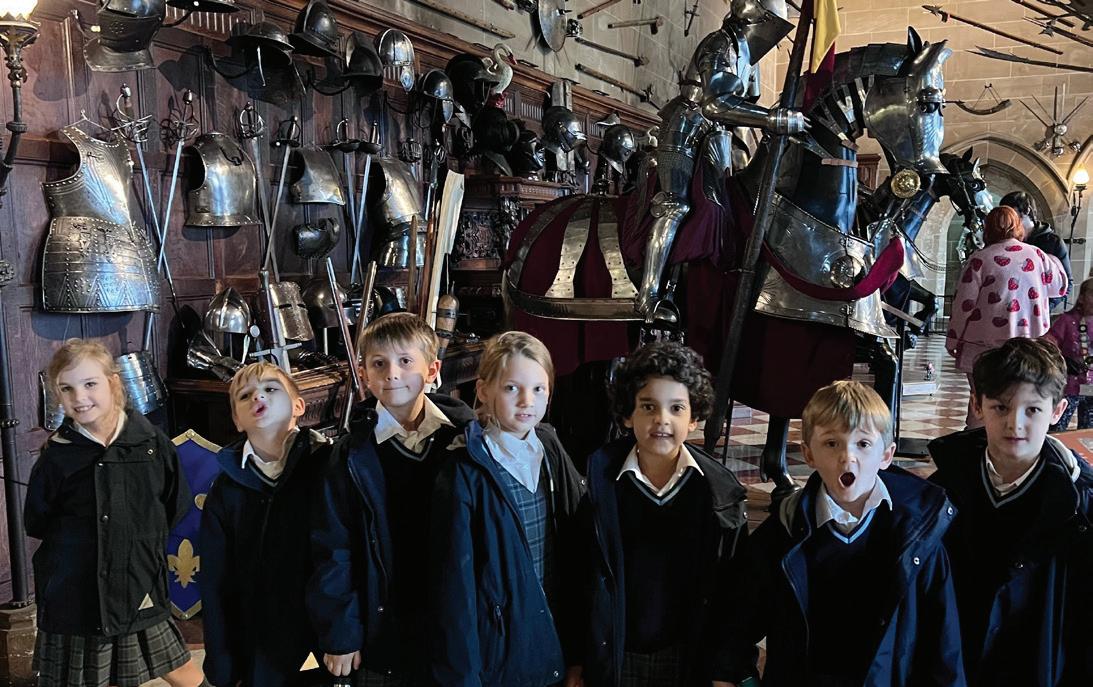
Author Visit to Prep School
Caroline Lawrence, author of the Roman Mysteries series, came to talk to Prep School

Special recognition goes to our Honourable Mentions Delegates: Oscar Luckett (Fifth Form, Vanbrugh), Charlotte Griffiths (Lower Sixth, Gascoigne), and Henry Shortland (Lower Sixth, Vanbrugh); Highly Commended Delegate: Marit Tweehuijsen (Lower Sixth, Feilden); and Best Delegates: Rohana Saunders (Lower Sixth, Queen Anne) and Finn Van Landeghem (Fifth Form, Vanbrugh)

Onatti Theatre returned to School with their new show La Maison Hantée about two girls staying in a haunted house. Charlie Guest (Second Form, Feilden) and Arthur Butler (Third Form, Swift) were brought out of the audience to help with the storytelling and performed admirably. Our Second and Third Form linguists showed enthusiasm and engagement, praised by the actors themselves. Whilst the language used was authentic and complex at times, our audience proved to be a real credit to their French teachers.
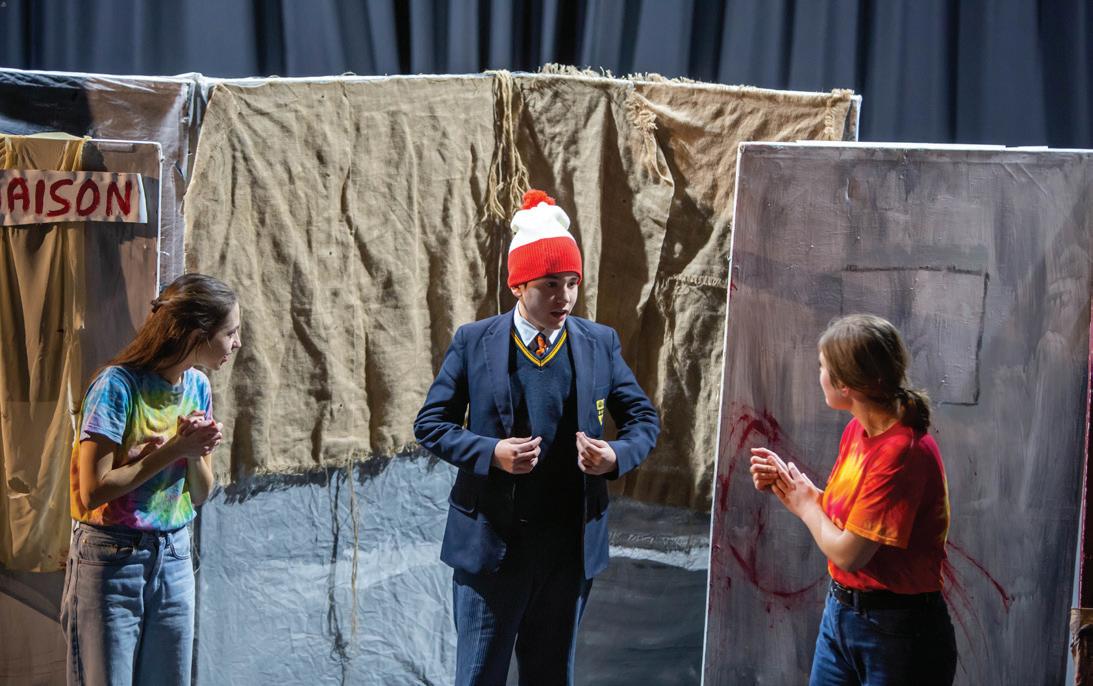
First Form Production
The dramatic talent of the First Form exploded onto the stage in a riot of colour, humour and physicality in the production of The Fairy Tales

Year 2 Trip to Warwick Castle
An Inspector Calls
Grimm. The drama began with a haunting and captivating performance of Snow White and the Seven Dwarves, which was followed by an energetic performance of Ashputtel complete with Tik Tok dances, helpful doves and comically violent amputations. The third piece entitled Iron Hans, was a surreal journey into the woods and magic of German folklore, with the final group using physical theatre to perform Hansel and Gretel. This ended with a terrifying sequence where the woods came alive with moving eyes and crackling firelight, however, we are happy to report that the First Form all lived happily ever after!
Second Form Production


were out cheering on their peers as they competed in their Houses, running a route beginning and ending under the Bell Tower. Speed and power were the order of the day, as our fastest runners sprinted the course with determination and spirit. The tension mounted as the runners traded the lead between the Houses with some outstanding individual performances.
to the Passchendaele Museum, the German cemetery at Langemark and Tyne Cot, where Evie Walker (Third Form, Swift) gave a moving reading of Carol Ann Duffy’s poem Last Post followed by a minute’s silence for the fallen.
Devizes to Westminster International Canoe Race 2023

Second Form dramatists delved into the shadows with their thrilling production of Dracula. The entire year group performed, taking responsibility for communicating a section of the story. With the use of minimal props and costumes, multi-rolling and physical theatre, they wonderfully conveyed this timeless tale of immortal desire and damnation. The audience was transported from the windswept wilds of Transylvania, through to the haunted graveyards, dank crypts and crumbling manors of England. This was a haunting and highly professional production, dripping with atmosphere and menace. Second Form demonstrated their ability to work well together to create a gripping narrative in the ghostly gleam of the limelight.
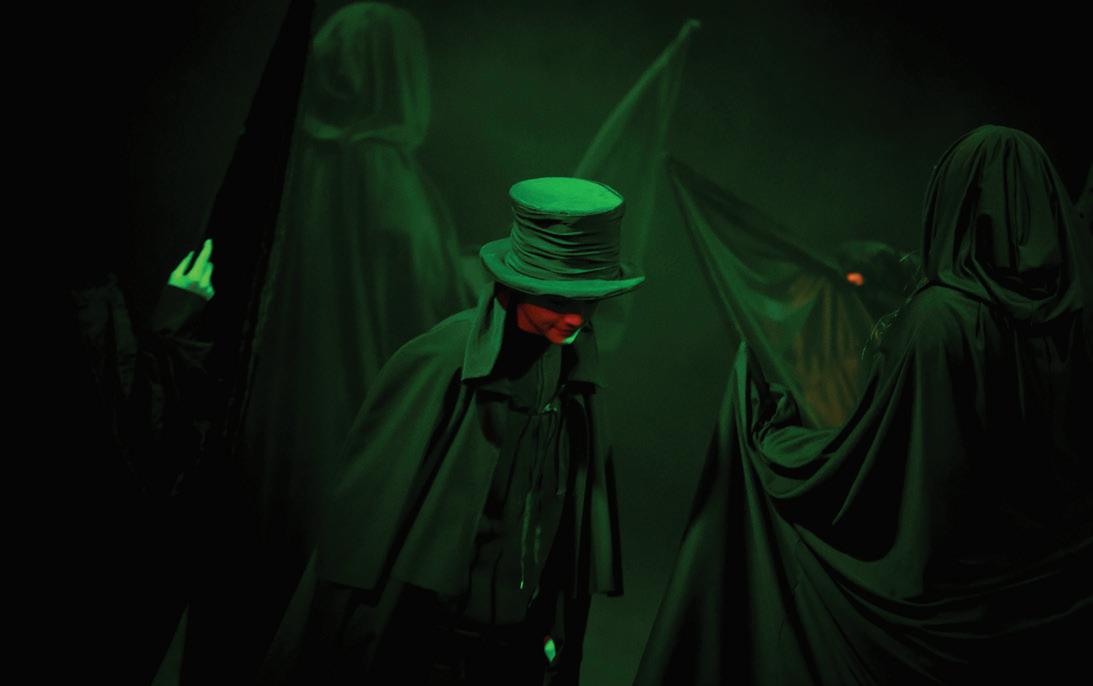
Crawford Relay
Following a postponement in October due to weather conditions, on Friday 10 March, the Crawford Relay took place around the School grounds. As is customary, the whole School

Congratulations to Queen Anne who proved victorious after just pipping Swift to the post. Amongst huge cheers and celebrations, Head of House, Joe Charlesworth (Upper Sixth, Queen Anne) graciously accepted the trophy from the Headmaster.
Battlefields Trip
The poignant trip to Ypres and the Somme region was a sombre and humbling reminder of the sacrifices made in the First World War. It was, however, a welcome return of this popular trip for Third Form pupils and teachers alike.

The three-day trip enables pupils to visit some of the most significant sites of the Western front starting at Hooge, followed by a brief stop at Essex Farm, where John Macrae wrote his famous poem In Flanders’ Fields, and on to Ypres and The Menin Gate. After laying a wreath as part of the Last Post Ceremony, the following day was spent journeying to France where the group toured the Somme. The contrast between the landscape around Ypres and the Somme was notable, and the powerful and deeply moving stories of soldiers’ courage under unimaginable conditions had a lasting impact on our pupils. The final day included a visit
Celebrating its 75th anniversary since its inception, the Devizes to Westmister Canoe Race (DW) saw the return of Cokethorpe pupils after the disruption brought on by COVID. Unforgiving rain across the weeks preceding the race resulted in high water, fast flows and dangerous weirs along the Thames. The impact of this meant the decision was made to finish the race short at Reading. Undeterred by the last minute change of course, our paddlers stepped up to the new challenge of paddling over 60 miles along the Kennet and Avon Canal across two days. The race has numerous aspects, requiring not just high levels of fitness, resilience and technique to paddle for over six hours a day, but the technical understanding of portaging, nutrition and working as a pair to paddle the two person kayaks. To add to the challenge, pupils have to set up camp and prepare their dinner unaided during the race. A huge well done to Sam Richards (Lower Sixth, Feilden) and Anna Pratley (Lower Sixth, Feilden), our mixed crew, who completed the course in impressive 10 hours 53 minutes and Tom Stevenson (Lower Sixth, Harcourt) and Henry Shortland (Lower Sixth, Vanbrugh) who clocked in an incredible 9 hours 34 minutes putting them in a top ten finish. The determination, integrity and attitude of our competing pupils was outstanding. The race does not just embody the Cokethorpe leadership characteristics but puts them to the test in a way very few young people would experience. Congratulations and well done to our pupils and the support crews for such a successful race.
Second Form Film in a Day
The Second Form took part in an exciting day learning how to produce and direct films using state-of-the-art technology. The Pupils learnt
the impact of using a variety of shots such as close ups and medium shots to create tension to a story using only acting skills supported by dramatic music. The day comprised of learning how to safely but realistically use fighting techniques from actors who had worked on the Mission Impossible film with Tom Cruise, which created great excitement from the pupils who asked meaningful questions to them on the experiences they have had in the film industry. At the end of the day, pupils watched their final pieces and Mr Stevens was on hand to present the winning group with their Oscar. Congratulations to Joel Davies (Harcourt), Bing Brown (Queen Anne), Luella Hickey (Swift), Elsa Linehan (Swift), Daisy Drake (Vanbrugh), Heather Homewood (Vanbrugh), Bella Clarke (Queen Anne) and Charles Stevenson (Queen Anne) who won best picture on the day.
Year 4 Residential Trip to Hill End

to maximising biodiversity and grassland habitats. Using nets, magnifying glasses, and binoculars, they hunted for wildlife in the grasslands and were thrilled to discover a slow worm! Later that day, they went pond-dipping, hoping to find pond life, and their search was rewarded with several dragon nymphs and even an encounter with a salamander. The trip concluded with a fun code-breaking challenge that required the group to use their orienteering skills to find clues spread across the entire site and decipher a code. An excellent residential trip enjoyed by all.
Fourth Form Classics Trip to the Ashmolean Museum
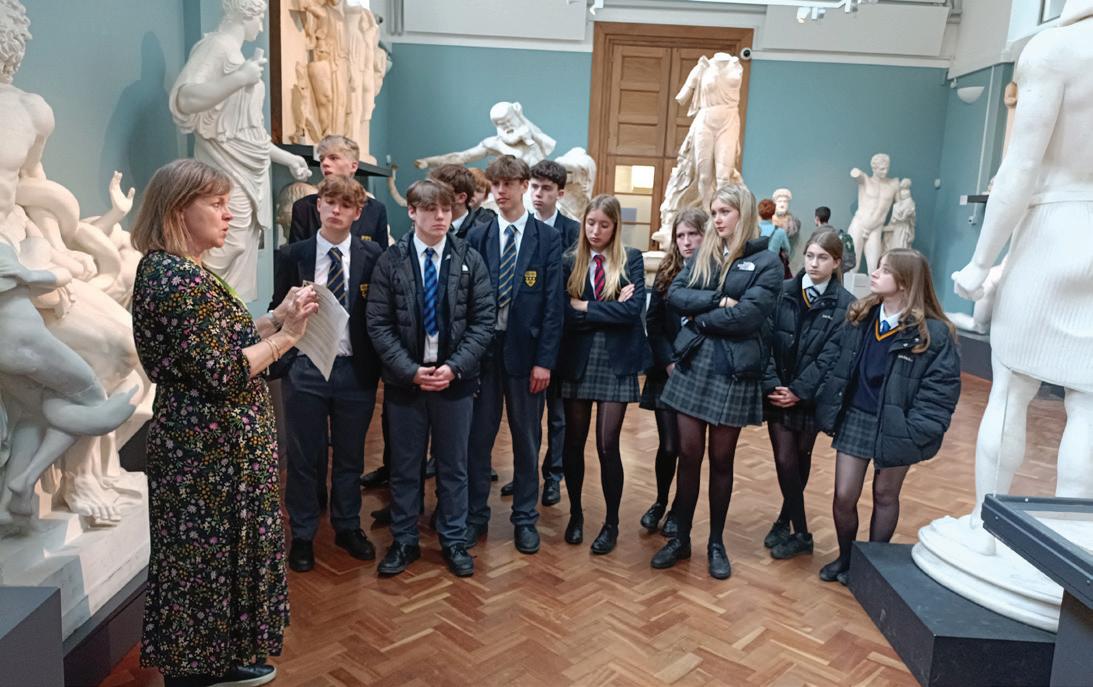
Dinner. They were treated to a delicious three-course meal, courtesy of the fantastic Catering Team. After dinner, Professor Ghassan Yassin of the University of Oxford inspired the attendees by speaking about his many research accomplishments in Astrophysics, including the invention of new superconducting detectors that allow radio-telescopes to map very distant galaxies and molecular clouds. He noted that there is still an exciting future in this field with many discoveries yet to be made. The new Scholars’ ties were debuted at this event. Well done to those Scholars in Fourth Form who took the initiative to create a new design of their choosing.
For most Year 4 pupils, the eagerly awaited residential trip to Hill End was going to be their very first experience of staying away from home. As a result, there was an air of nervousness on the Tuesday morning which soon subsided upon arrival. The group went on to thoroughly enjoy their afternoon exploring the woodland, having a barbecue for dinner and completing a challenging trail. The following day, the pupils participated in a range of activities, including fire lighting, den building, and team-building challenges. After a delightful picnic lunch, they had some free time to further explore the woods and build dams in the little stream. Enjoying s’mores around the campfire that evening was the perfect way to end the day! On day three, they explored an area of the site dedicated
On the morning of Tuesday 9 May, the Classics Department took all Fourth Form pupils studying Latin and Greek to the Ashmolean Museum in Oxford. Their first stop was the Museum’s acclaimed new exhibition, Labyrinth: Knossos, Myth and Reality. Here, they had the chance to explore the first ever UK exhibition to focus on the palace of Knossos in Crete. Knossos was the centre of the Bronze Age Minoan civilisation, named after the legendary King Minos and first excavated more than 100 years ago by Sir Arthur Evans, the first director of the Ashmolean. The exhibition included over 100 objects which have never before left Greece, alongside discoveries from the Ashmolean’s archive.
Pupils also took part in a one-hour workshop exploring everyday life in Ancient Rome using primary evidence. They were taken to the Museum’s Roman galleries and had the opportunity to view key objects covering aspects of Roman life. In doing so, they deepened their knowledge of topics studied at School, gaining experience of handling real Roman artefacts such as lamps, coins and pottery. Pupils greatly enjoyed the insights this gave them into the world of Ancient Rome and the interesting counterpoint it provided to their earlier exploration of the Minoans.
Scholars’ Dinner
On Thursday 27 April, over 130 pupils, parents and teachers gathered for the annual Scholars’
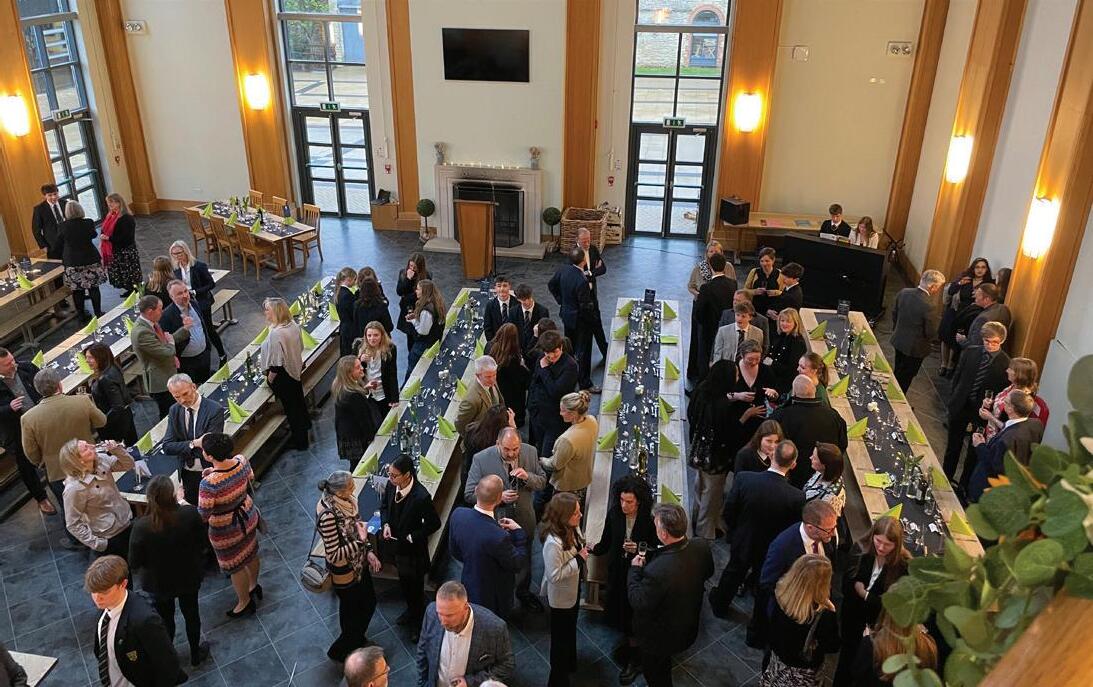

May Day Madrigals

On the morning of Tuesday 2 May, 50 singers from the Prep and Senior Schools, as well as staff, welcomed the arrival of spring by singing three madrigals from the Mansion House. The Senior Choir sang Now is the Month of Maying and Since First I Saw Your Face, which was followed by the Prep Chamber Choir performing Of All the Birds That I Do Know It was a lovely occasion, especially since the Choirs were able to perform to the combined Cokethorpe community.
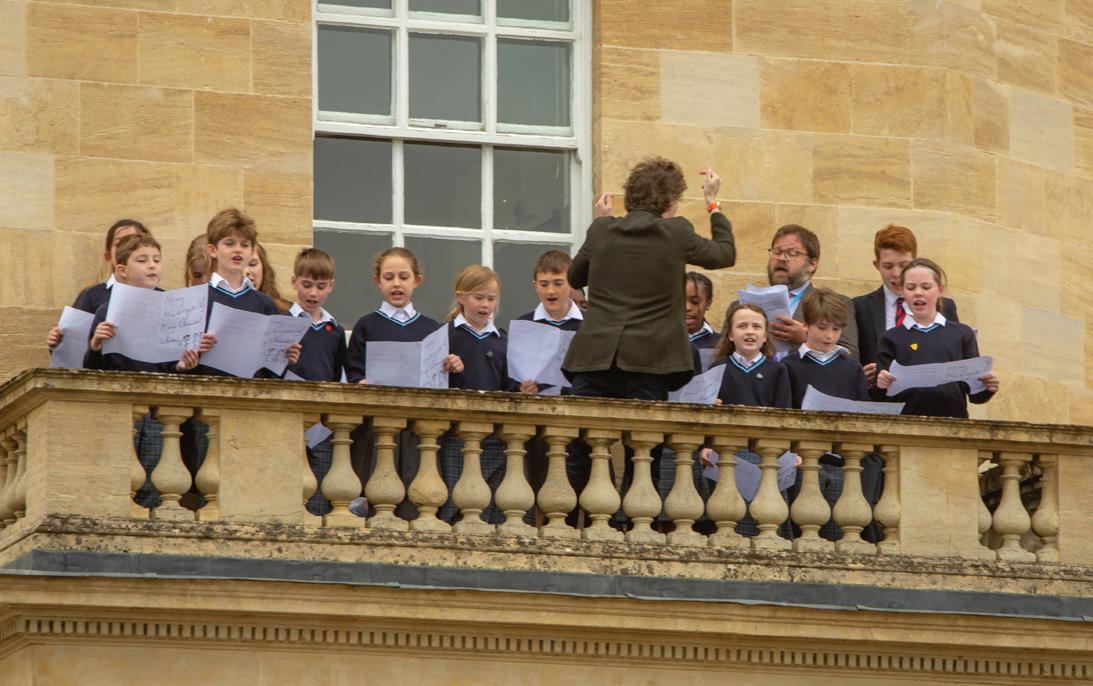
CPFA Easter Tea Party
The Dining Hall was awash with delicious cakes, fabulous artwork and craft stalls at the CPFA Easter Tea Party, all thanks to the incredible efforts of our fabulous Prep School pupils. Both the CPFA and the pupils worked incredibly hard to deliver this wonderful event.
Prep School pupils had also been challenged with creating an Easter display using
decorated hard boiled eggs. There were many fabulous entries, so choosing the winners proved extremely difficult, but many congratulations to our prize winners: Lisa Wang (Year 2, Lockwood), Jaden Orewa (Year 3, Lockwood), Roemer Tweehuijsen (Year 4, Lockwood), and William Chandler (Year 6, Symonds). The event raised an amazing £668.80 for the Blue Cross Charity.

Year 5 Visit from Science Oxford
Ancient Greek Reading Competition

genres, what unified all the performances was the amazing energy, dedication and focus of every single performer. Congratulations to all our talented musicians for an exemplary concert.
Prep School Production of Romeo and Juliet
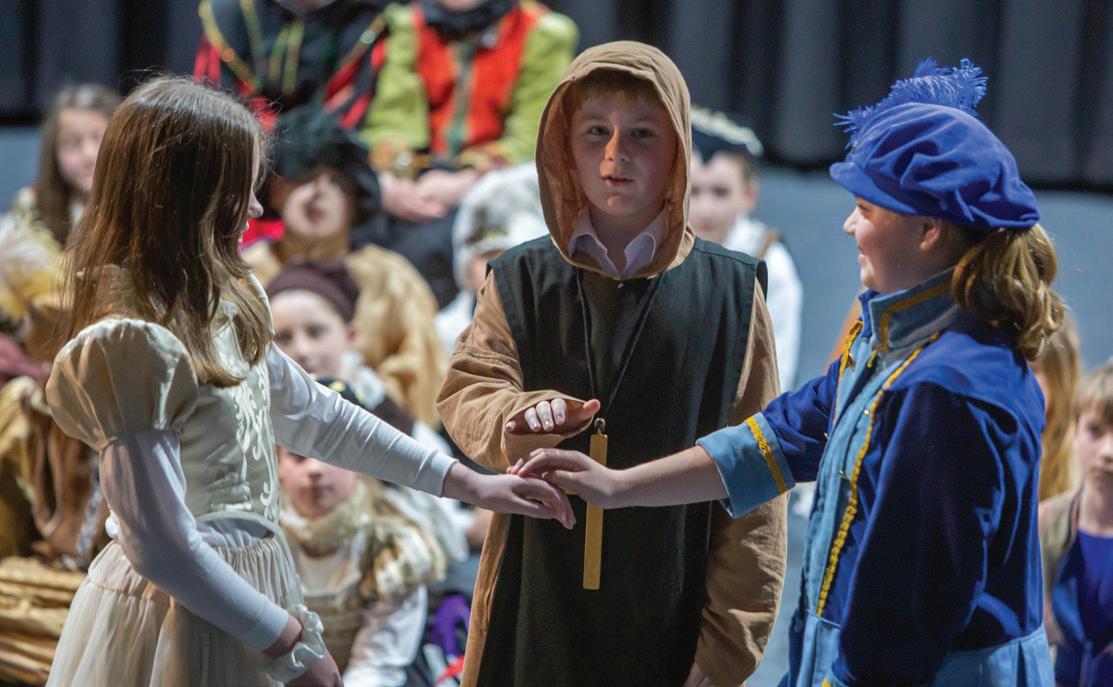
Congratulations to Amelia Palmer (Third Form, Feilden) and Ellie Lunn (Third Form, Swift) who stormed to victory in the Latin and Greek Reading Competition. The two Third Form Ancient Greek AOB pupils were invited to the University of Oxford to compete against almost 100 pupils from schools from across Oxfordshire.
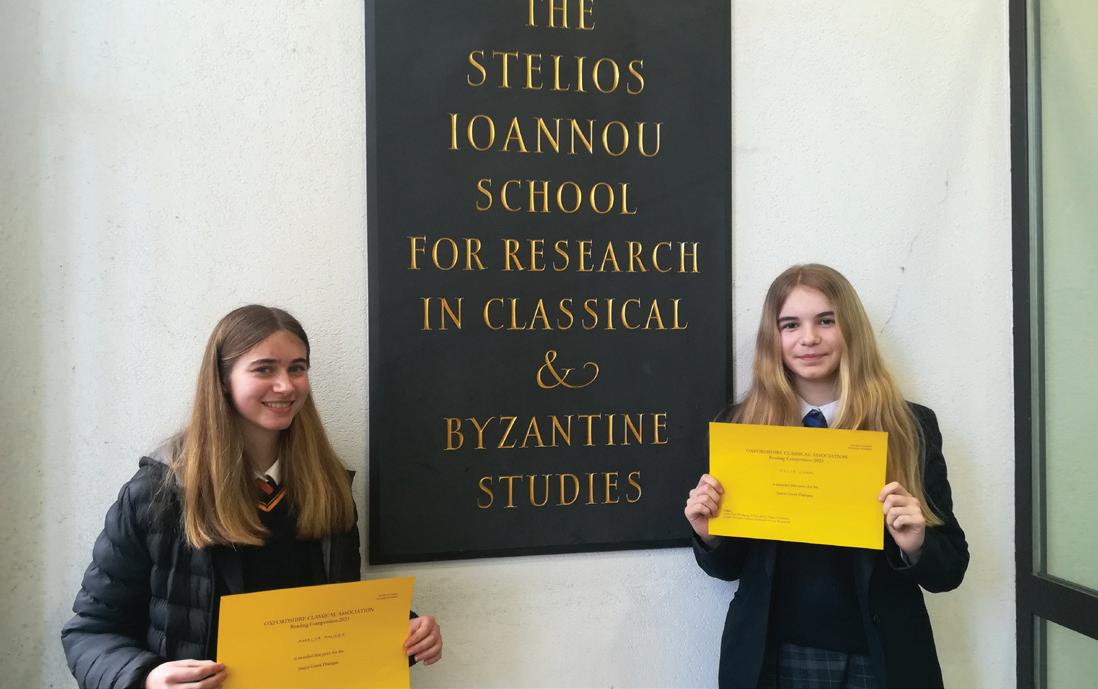
Their fantastic performance of Euripides’ Electra meant they won their category, beating multiple other entries and impressing a judging panel of experienced faculty members. They performed the scene in the original Greek language and metre with clarity, pace and dramatic flair with faithful conveyance of meaning which was praised by the judges. This affirmed Ellie and Amelia’s hard work and responsibility to practise their piece, as well as their courage and ambition to try new things.
When Shakespeare wrote Romeo and Juliet it is unlikely that he ever imagined a cast of 55 children aged nine, ten and eleven enacting his sixteen-part play so professionally. In the Prep School, however, challenge is to be embraced, and nothing is ever too difficult; a thirty-minute script was created in which our Year 6 pupils enacted the original Shakespearean text alongside newly created lines of iambic pentameter written especially for our Year 5 narrators.
On Thursday 9 May, Year 5 had a ‘Rockets and Rovers’ workshop run by the fantastic Science Oxford. Pupils experienced two spectacular workshops that encouraged both creativity and scientific thinking. In the first activity, pupils wrote algorithms in Mission Control, so that their Mars Rover buggy could follow a maze-like path. They learnt about the coding language of Python, to determine the speed of each motor and how long these motors ran. After trialling their buggies, they adjusted their code until the buggy successfully followed the road and avoided obstacles that might be found on Mars.

Throughout the rocket making task, pupils discussed air power and the concept of water acting as a propellant. The classes worked in pairs to design and decorate large plastic bottles which could be safely launched outside, using compressed water and air. Once their rockets were completed, they launched them, changing the amount of water in each bottle to find out what amount would propel the rocket highest. Some of their launches reached heights of over 30 metres. It was a fabulous morning of hands-on learning and Mrs Bassey was only hit once!
Spring Concert
The performance was a culmination of a full term’s intensive work to properly understand the complex language and Tudor times, before beginning to enact the play. The pupils’ astounding talent and hard work was made all the more dazzling by the exceptional costumes provided by Mrs Wilkinson and the lighting provided by Mrs Whitcombe. The production was directed superbly by Mrs Luckett who was ably assisted by Mrs Bassey and Mrs Procter. The evening was a triumph and, most importantly, the pupils commented upon their new-found love and understanding of all things Shakespeare.
The atmosphere was electric at this year’s Spring Concert, which marked two firsts in the history of Cokethorpe’s Music Department: it was the first concert ever to take place in the Dining Hall, where the performers could take full advantage of its glorious acoustic; and it was also the first time Prep and Senior musicians came together to share a concert.
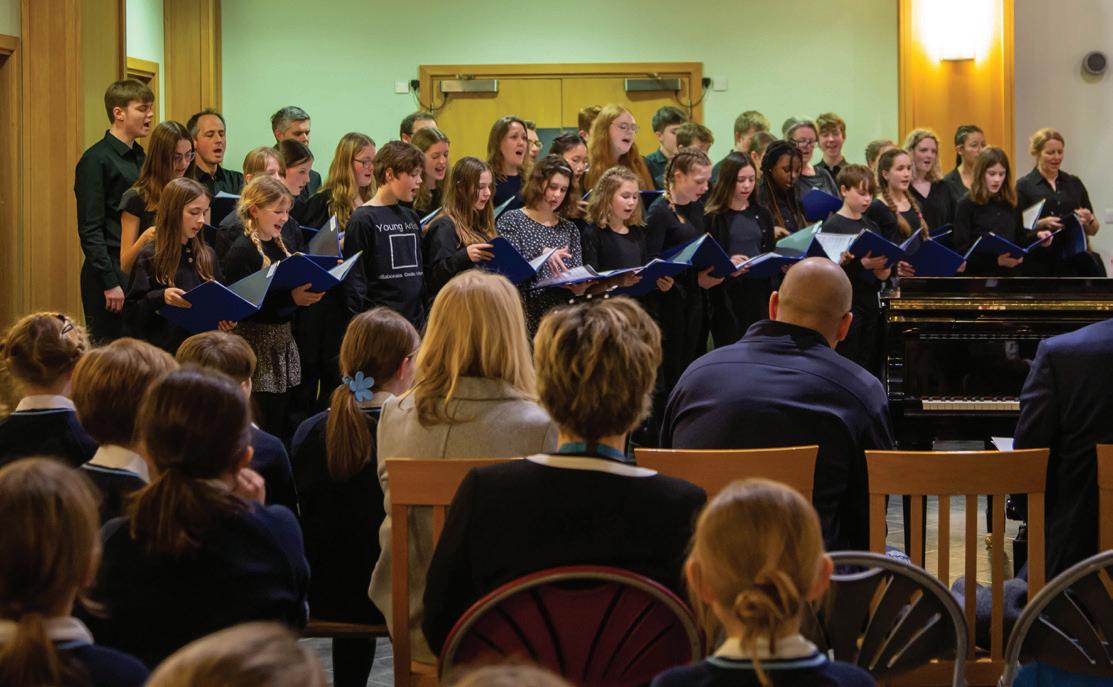
The spotlight was on ensemble music-making with the full-to-capacity audience being treated to performances by Cokethorpe’s four choirs, the Orchestra, Rock Band, and Clarinet, Brass, Piano and String Ensembles. Although the concert covered a cornucopia of musical
Fourth Form French Exchange
The Modern Foreign Languages Department were delighted to welcome back the French exchange programme, allowing a group of nineteen Fourth Form pupils to travel to the idyllic Marignane, in the South East of France. Pupils were able to put the French they have been studying in their lessons into practice, living with their local exchange family whose children attend the collège Saint-Louis Sainte-Marie. Pupils spent a few fulfilling days experiencing life with their new families, some embarking on extraordinary trips on a yacht, hiking in the area or visiting the beach. Staff organised a visit to Aix en Provence, including lunch in a
traditional restaurant and a stroll through the old town streets. The sun was shining on the group for their boat trip to the national park of Les Calanques, drawing to a close a wonderful and enriching trip for all involved.

Cokethorpe Recognition
the game on penalties after a nail-biting match. Unfortunately, they lost 3-2 in the Southern final against Milton Abbey, but should be very proud of their performance throughout the competition.
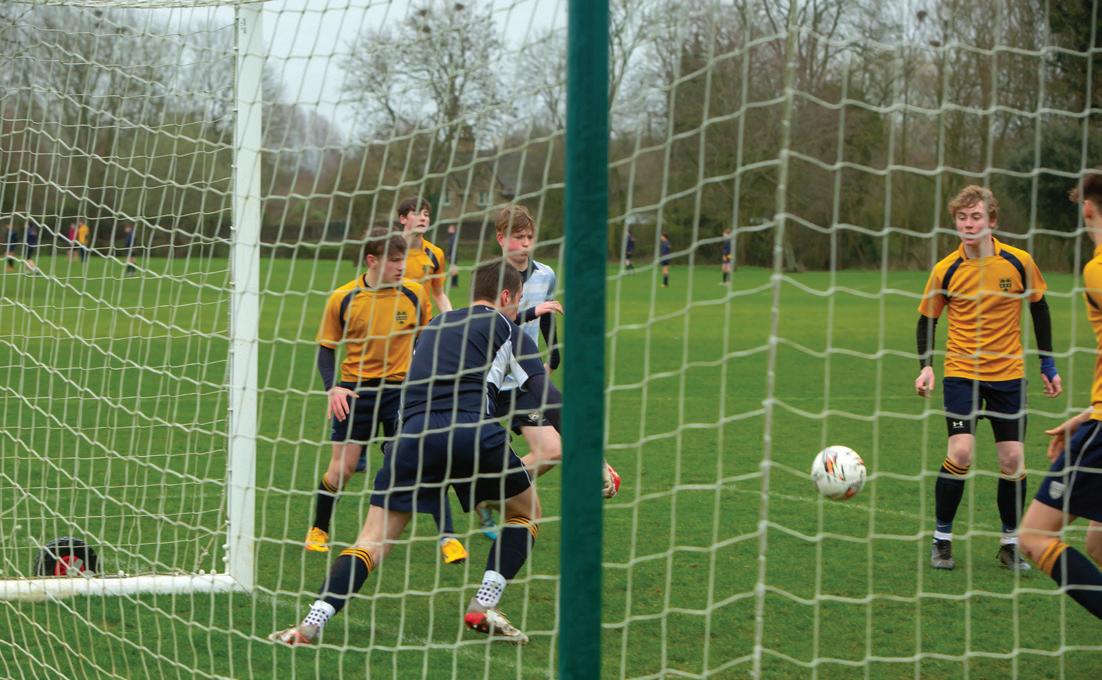
It has been a successful few months for the School, with recognition received across the Pre-Prep, Prep and Senior School.
Mrs Procter (Year 5 Teacher and Head of Prep Maths), was shortlisted by TES in the Schools Awards 2023 for Primary Curriculum Leader of the Year, which celebrates the work of teachers and staff across the UK’s schools. This is a fantastic achievement and demonstrates the passion Mrs Procter has for maths and the creative ways in which she shares that passion with pupils.

We were awarded ‘Highly Commended’ in the category of ‘Most Creative Learning Through Play (Early Years)’ in this year’s Muddy Stilettos Schools Awards. Muddy Stilettos is a lifestyle and Independent Schools reviewing body so it is another fantastic achievement for our Pre-Prep to be recognised.
The Maths Department has received a Sparx Super Star Award. These are only awarded to a few schools each term, so we are thrilled to have achieved the ‘Highest Achiever – Bronze’ Award, placing Cokethorpe into the top fifteen schools.
Society of Heads’ Football
Congratulations to the First XI Football Team who won the semi-final of the Society of Heads’ tournament against Shiplake, winning
The U16s also had plenty to celebrate, as they travelled to Hanborough Town FC to play Highclare in the Society of Heads’ final. Unfortunately, they too only just missed out, with a last-minute goal. They should take real pride in their season and performance against a team packed with professional academy players.
Higher Education Fair

she discarded a previous work-in-progress. Atwood also recounted the creation of an ‘unburnable’ edition of the book which was auctioned to support the prevention of book burning in countries around the world.
Tom Rocks Maths
On Tuesday 2 May, we hosted our annual Higher Education Fair. The evening was attended by both Lower Sixth and Fifth Form pupils. We had several Russell Group universities in attendance as well as specialist universities, with three well-attended talks throughout the evening, ‘What’s so special about the Russell Group’ presented by the University of Southampton, ‘Careers in Sport’ presented by UCFB – University Campus of Football Business and lastly ‘Studying a Degree apprenticeship’ presented by the University of Exeter. All three were incredibly informative and thought-provoking.
Margaret Atwood Talk

Upper Sixth English Literature students visited the Emmanuel Centre in London and were privileged to hear a talk from the renowned author, Margaret Atwood. Margaret spoke in great detail about her writing process, and shared insightful anecdotes about the creation of her seminal novel and set A Level text, The Handmaid’s Tale, and how it came to be after

Just before the Easter break, Third Form and Lower Sixth students welcomed Dr Tom Crawford, a Mathematics tutor at the University of Oxford, to Cokethorpe. Tom runs the award-winning website tomrocksmaths.com (You Tube channel @ tomrocksmaths).
Dr Crawford gave an engaging talk to the Third Form on how the England Football team could improve their penalty shootouts by using mathematics.
Following the first lively talk, he then introduced the Sixth Form mathematicians to the seven Millennium Maths problems , talking in greater detail about the Riemann Hypothesis, The Poincare Conjecture (the shape-shifting world of topology) before finishing with the Navier-Stokes Equations
NB. The Poincare Conjecture has been solved: Can you take any four-dimensional smooth object, that doesn’t have any holes, and turn it into a sphere? Yes, you can. It took the Clay Institute eight years to verify the solution submitted by Gregori Perelman.
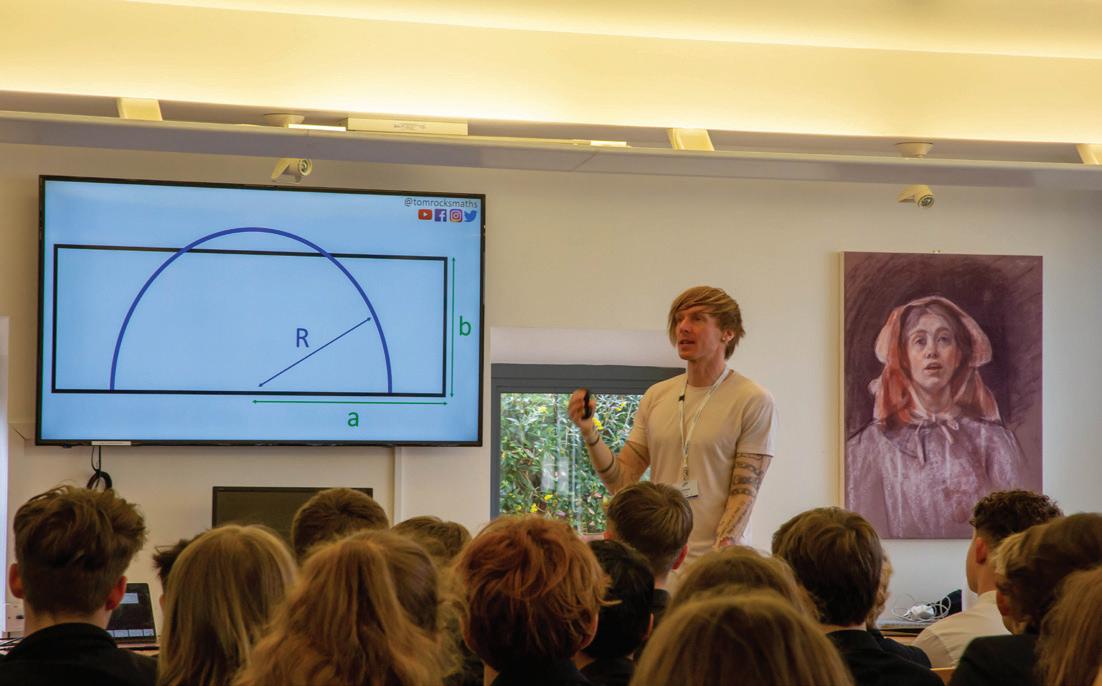
TRANSITION TO SENIOR SCHOOL

Drama, DT, and a carousel of AOBs. I hold an assembly at the end of the day, giving pupils more information about the transition and what they can expect in First Form.
We have also implemented a scheme where parents have the opportunity to come in prior to their children joining, allowing them a chance to share any thoughts, questions or concerns they might have about the process of moving up to Senior School. This opens up discussions for them to have with their children at home too.
We spoke to Mr O’Connor, Housemaster of Lower House, about preparing pupils for Senior School.
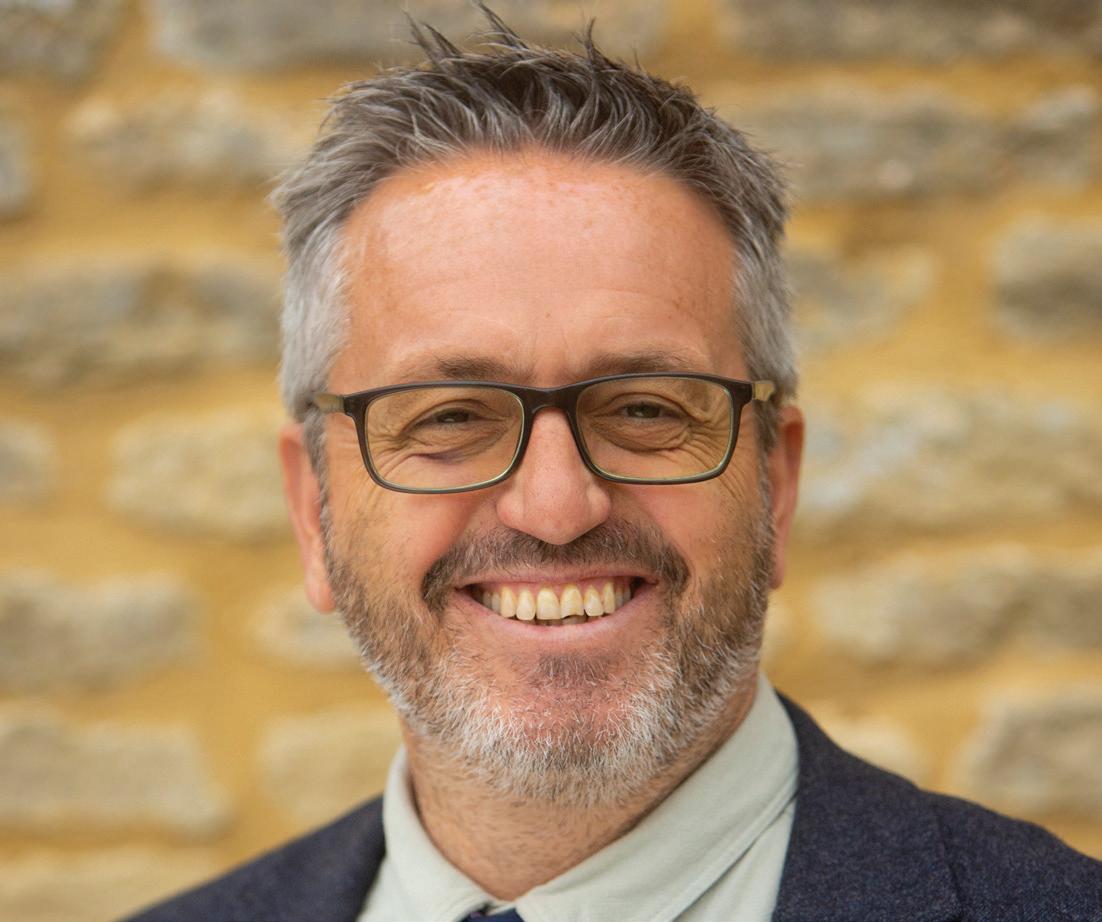
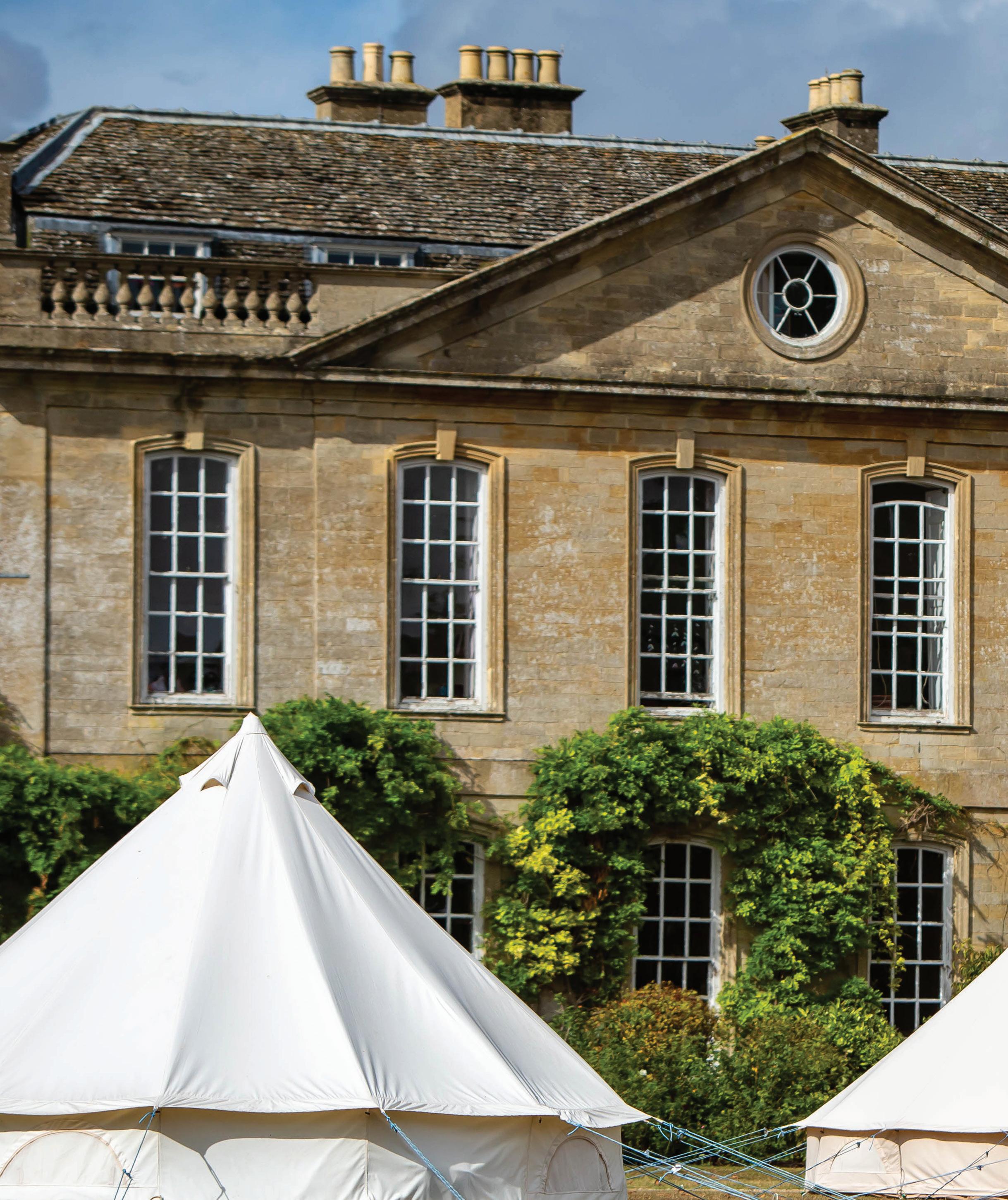
Can you tell us about the ways in which we prepare pupils, both internal and external, for the transition from Year 6 to the First Form?
Over the last couple of years, we have put together a programme where pupils in Year 6 participate in a series of taster lessons in the Senior School, in Science, Latin, Modern Foreign Languages and Sport for example.
External pupils are invited to attend our transfer day. In recent years, we have developed this to include more formal taster lessons for the pupils, as well as a sporting activity, Music,
What is the thought process behind having a ‘Lower House’?
We find it is a system that works really well. It gives us the opportunity to give First Form pupils that little bit more nurturing when they join the School, whilst still allowing them to be part of the main Senior School House system. They are easily identifiable in Lower House as they have their own ties.
Having House assemblies, activities, trips and competitions purely for Lower House enables them to really bond with their peer group. However, if they want to participate in the Crawford Relay, House Drama or House Music with the older pupils, they are still able to do so.
What is your role as Housemaster of Lower House?
I am part of the Housemasters team. Within Lower House, we have six tutors; it is my responsibility to oversee those tutors and ensure that pupils are kept safe and happy in School, academically and pastorally. I am a point of contact for the tutors, but also for the pupils themselves. Every week, I hold a House assembly where we do a variety of things, incorporating the six traits of our Leadership Programme.
What is the Head of Lower House?
They are a member of the Sixth Form chosen to represent just those pupils in the Lower House. As well as organising the Lower House Disco, they are another point of contact for pupils. There is also a buddy system, the Tutor Partnering Programme, where a student from the Sixth Form team comes into their tutor groups on a Tuesday, which rotates throughout the year.
What do you see as the main challenges for pupils in coping with the transition?
It is natural that pupils who have been friends in Prep School will gravitate towards each other, but by doing all the things we have discussed above we aim to make sure everyone is included wherever they are joining Lower House from. The camp in particular breaks down those barriers, we also find that at that age they are keen to make new friends, so external pupils quickly become part of the friendship groups. We also introduce a buddy system if anyone needs it.
Another area where pupils may need some support is becoming familiar with using the Surface Pros and the other technology we have in the School. There is a real advantage to having everything digitally now, especially timetables for example. However, some pupils may need more support doing everything electronically if they are not used to doing this, using Teams to communicate with staff and keeping on top of their work.
What about the study skills they require in Senior School?
As part of the First Form curriculum, they have what we call ‘WIT’ which they do as a year group. They also have a separate study skills teacher through the Cokethorpe Diploma, who guides pupils on how they can learn, understand new concepts and adapt to things they might not have done before. This could be their first experience of formal exams in separate subjects for example, so we teach them methods of revision and techniques to concentrate and focus.
We spoke to First Form pupils
William McHale (Feilden), Lottie Graves (Gascoigne), Connie Cannell (Queen Anne) and Alexander Phinbow (Swift) about their experience of the transition from Prep School to Senior School.
The transition from Prep School to Senior School can be nerve-wracking for some, whether that be from an external school or from Cokethorpe Prep School. What were your experiences of the move to join the First Form?
WM – I came from a small primary school and was the only one of my peers to come to Cokethorpe, but I found lots of friends very quickly and found everyone here was very welcoming.
LG – I came from a local primary school too, but my sister was already here which helped. The First Form Camp really helped me settle.
Connie and Alexander, you were both in Cokethorpe Prep. How did your experience differ from that of Lottie and William?
CC – We already had lots of friends coming from the Prep School to the Senior School, we were also familiar with lots of staff as we have seen them around in the Prep School.
AP – I have been at the School for quite a long time now, so I know my way around pretty well, but it was nice to have some familiar faces to help you if you did get lost!
What have been the major differences between being in the Prep School and the Senior School?


CC – The Senior School is a lot bigger than the Prep School, and you change
classrooms for all lessons with different teachers for each subject. In the Prep School, you are mainly in the same classroom with the same teacher.
LG – I also really like the way the AOBs are set up, it allows me to meet pupils in other year groups and meet likeminded friends with similar interests.
WM – My school was very small and only had one teacher for every year group, so it was a really big change for me coming to a School with so much space and so many teachers.
Were there any other significant challenges moving up? Has it been a positive experience for you overall?
LG – It has definitely been positive. I think you will find a very common response is that we have a lot more homework than we used to! Staff are always really helpful though, we know when everything is due in.
AP - Also, in our study skills, which is one of the lessons we have once a fortnight, we have talked about different ways of keeping on track
and up-to-date with everything which has been hugely helpful.
CC – There is more homework, but we also get more time to do it. For example, there are AOBs we can use to catch up on homework which helps to manage our workloads.
Earlier you mentioned the First Form Camp, can you tell us a bit about that and how that helped you to settle in?
CC – It was lots of fun, and nice to share a tent with your Form, so you knew who was going to be in your Form group. I am not sure how much sleep I got, but it was worth it!

WM – Meeting the year group before I started made the transition so much easier.
AP – I loved it because we got introduced to the new pupils starting from other schools and I made new friends. It would have been much harder to do this once we had already started with all our lessons whilst we were trying to find our way around!
Mr O’Connor and our First Form pupils were talking to Mrs Williams, Communication Manager.
DEVELOPMENT UPDATE: PROVIDING A BRIGHT FUTURE
Director of Development, Nicky Wynne, outlines some of the upcoming projects at the School.
When I think about Development for our School, I do so with a broad brushstroke. Creating a refreshed culture of giving – giving to Cokethorpe, whether by donations or other means of invaluable support, and Cokethorpe giving back, to our pupils, our parents, and our alumni in the Society, and to the locality we are in and beyond – is an exciting opportunity for us all to be involved in. Together, we are shaping where we are now – a thriving School – and where we want to be in 2027 – our glorious 70th anniversary year.
As an agile and young educational establishment, endowments and substantial reserves are not a luxury we have, but we can hold true to our core values and, with carefully measured risk, provide exceptional breadth with individual focus. The recently formed Development Department is here to work inclusively, through income generation work, to deepen relationships and partnerships, realising ambitions and bringing in new opportunities for our School.
If you have not yet had the chance to do so, please do take the opportunity to visit our transformed boathouse. Now known as ‘The Greaves Outdoor Centre’ this great facility now also includes a dedicated outdoor education classroom and could not have been realised without the vision of major donors and the hard work of our own staff. Looking ahead, and, again, thanks to generous funding support, we are planning to build a new climbing tower complex. Located near the cricket nets, this new project will have disability access and will bring great joy to a diverse audience.
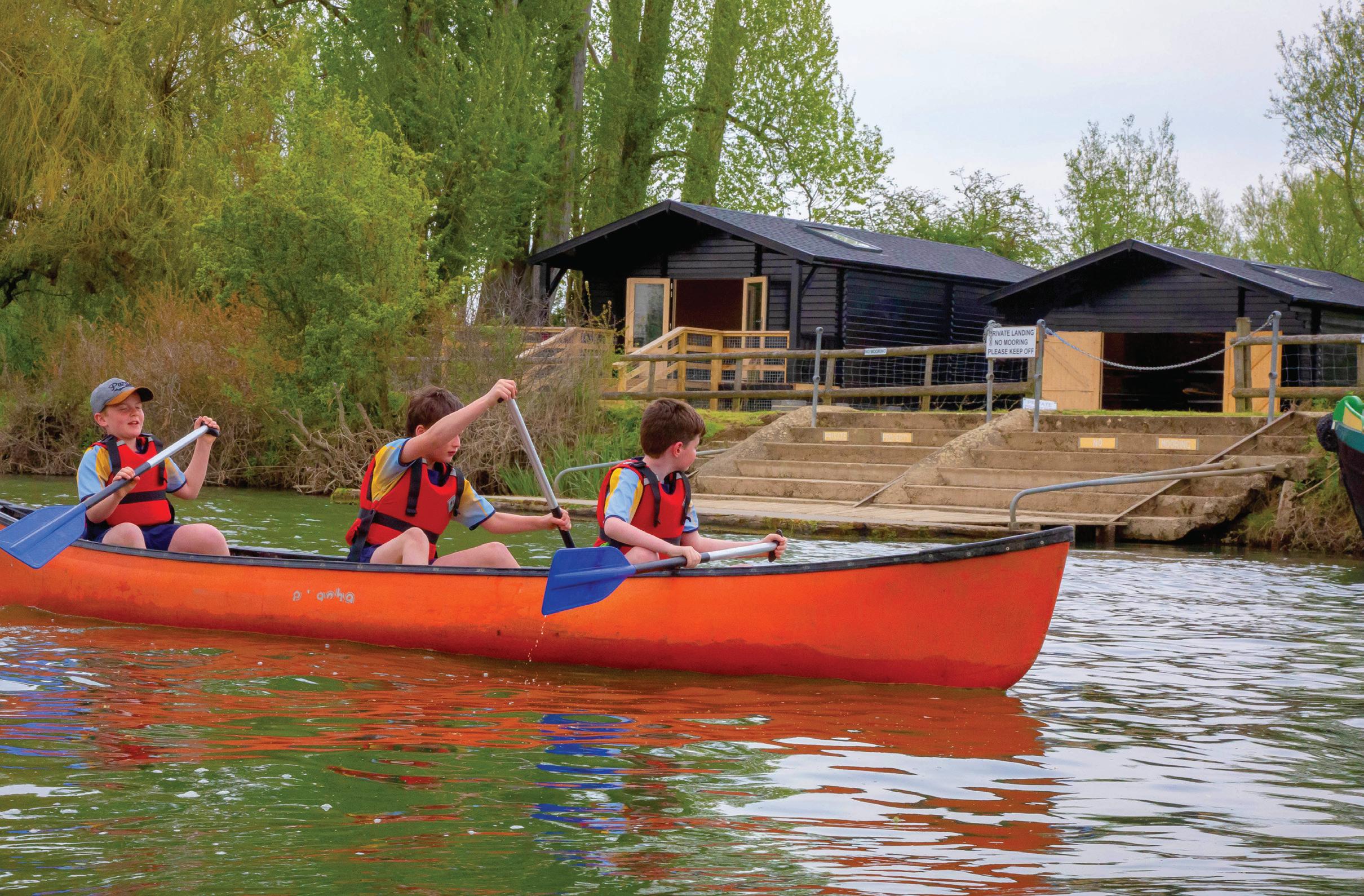
Meanwhile, we are also occupied with other projects and events that we hope our OC Society and others will wish to support. Working closely with an esteemed former teacher, Peter Green, we are running a fundraising Sports Campaign, to bring in as many donations as possible, contributing funds to the renewal of our Astro Turf pitches.
Always remembering that fun, creativity, good food and laughter are important to us all, Cokethorpe is holding our first ‘Gig on the Green’ on the afternoon of Saturday 9 September. Our headliner is Levi Roots, supported by some exceptional bands, and further details of the ‘Gig’ are on the back of this issue of The Ocellus. Tickets will be on sale from Friday 9 June; be sure to purchase yours before they go on public release the following Monday!
I would like to take a moment to recognise and to give our heartfelt thanks to you, for your dedication to Cokethorpe. It is only with support such as yours that we can remain agile and ambitious. With your help, the vision for our School is sure to become a reality.

If you wish to discuss any aspects of development with me, please contact me at naw@cokethorpe.org
Ms Wynne Director of Development
THE COKETHORPE SOCIETY: MOVING FORWARD
Charlie Bartlett (OC Feilden, 2008), Chair of the Cokethorpe Society, on the future of the School’s alumni association.

As Chair, how would you like to see the Society develop?
Thinking back to my time at Cokethorpe in the mid-2000s, there was certainly a regular presence from the Society around the School – our current President, Tony Baker (OC 1957), for one. I remember playing in the OC Sports events and that sense of camaraderie between pupils present and prior was an enjoyable one for sure. This relationship and the involvement that members of the Society have in the day-to-day life of the School is something I would be keen to see fostered. From the School’s side, the establishment of the Development Office and the employment of an Alumni Relations Manager (Ms Hodgkins) will be a huge benefit to this objective. Ultimately, whether we are sixteen, 23, in our 40s, or retired, Cokethorpe is still our school and, as such, is a permanent fixture in our lives.
How would you like to see that relationship nurtured?
I think having more events that OCs are involved in would be a good starting point. Events for OCs to reconnect and to socialise have their place, but I think of equal or greater importance will be more OCs attending existing School events, bringing the whole extended Cokethorpe community together. There are so many exceptional events run by the School, many of them through the Cokethorpe Parents’ and Friends’ Association (CPFA), that I would love the Society to attend – the Fireworks in my day were brilliant, but the ‘Extravaganza’ now is just another level; who wouldn’t want to be a part of it?
What do you see the role of the Society being in the future progression of the School?
I think we all know what challenging times we are going through with the national and global financial pressures having an impact on business and household running costs, and schools are no more immune to this than any of us. We also know the value of an education like the one which Cokethorpe provides. I believe we should be finding ways as an alumni network to support more children having access to the fantastic opportunities being a Cokethorpean provides. Whether through supporting bursaries or having more of us available to offer advice on our industries and careers, there are ways we, as an alumni body and members of the Cokethorpe community can really contribute and give more back to the School which gave us so much. We are also a young school and, with investment in the fabric of any school so important to its continuing success, I would like to see the Society supporting capital projects as well, because we all have pride in our School and want to see it striving still further.
What does being an OC mean to you?
Community, first and foremost. Thinking back to my time at the School and the sense of belonging I felt, what really stands out to me is how little that feeling has abated. We are still a community, still part of the School and also a part of our peers’ lives. I still have many friends whom I was at School with and with whom I remain close. I also think that community comes through in community-mindedness, by which I mean being supportive of our communities. That sense of responsibility was an important part of what the School instilled in us, and I know it is an integral part of the Leadership Programme at Cokethorpe today.
Do you have any memories that particularly stand out from your time at Cokethorpe?
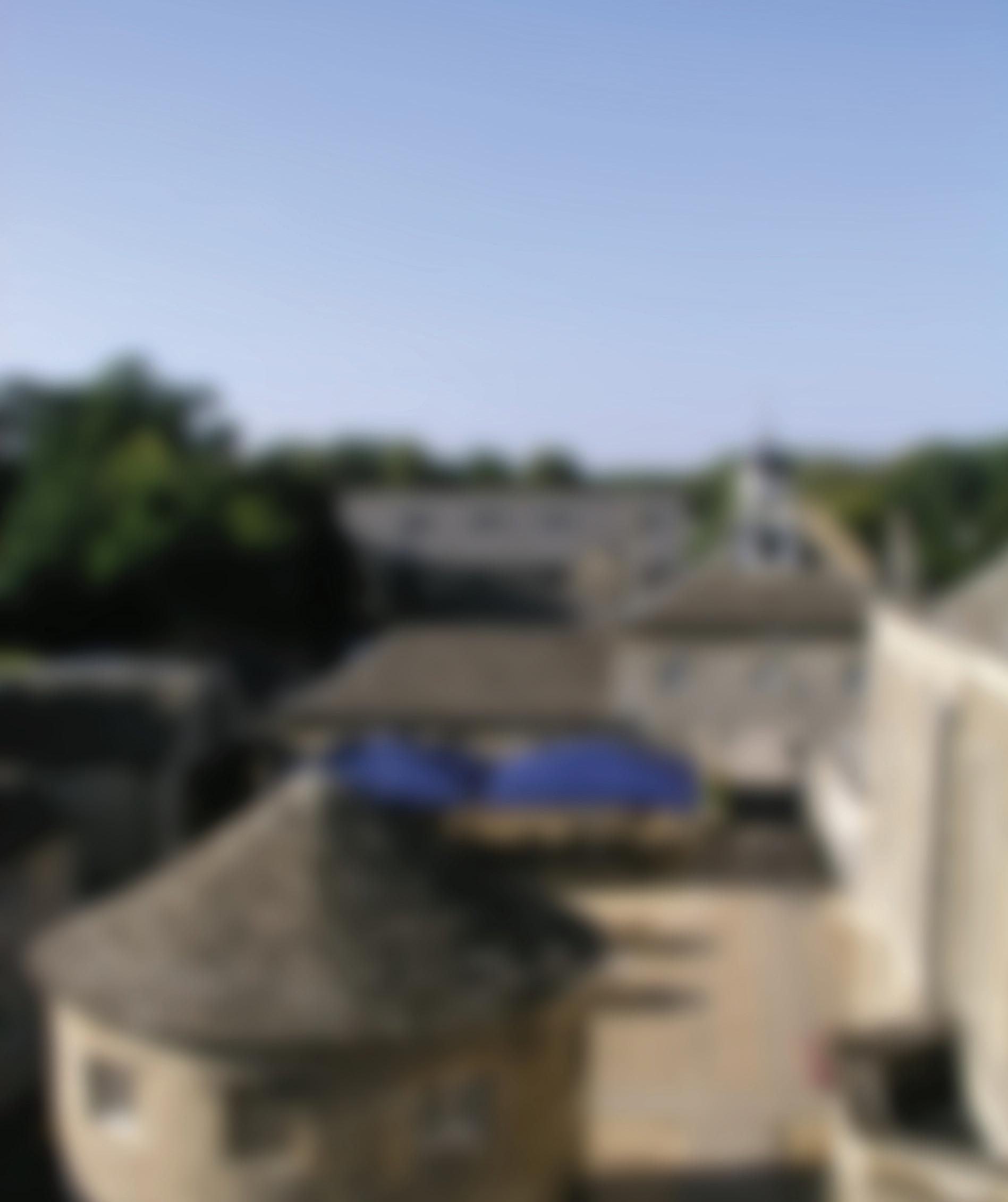
I expect everyone says this, and I know it is one of those corny lines, but it is genuinely the case that I really would not know where to begin in picking just one! How can you? Maybe being Head of School. Fundamentally, though, the experiences I had and the things I learnt – not just lessons but the life skills and all the other things that contributed – have gone such a long way towards where I am and who I am today that it is hard to pin down definitively to a few sentences.
Charlie was talking to Head of Marketing, Mr Griffiths.
COKETHORPE CREATIVITY - YOUNG ART OXFORD

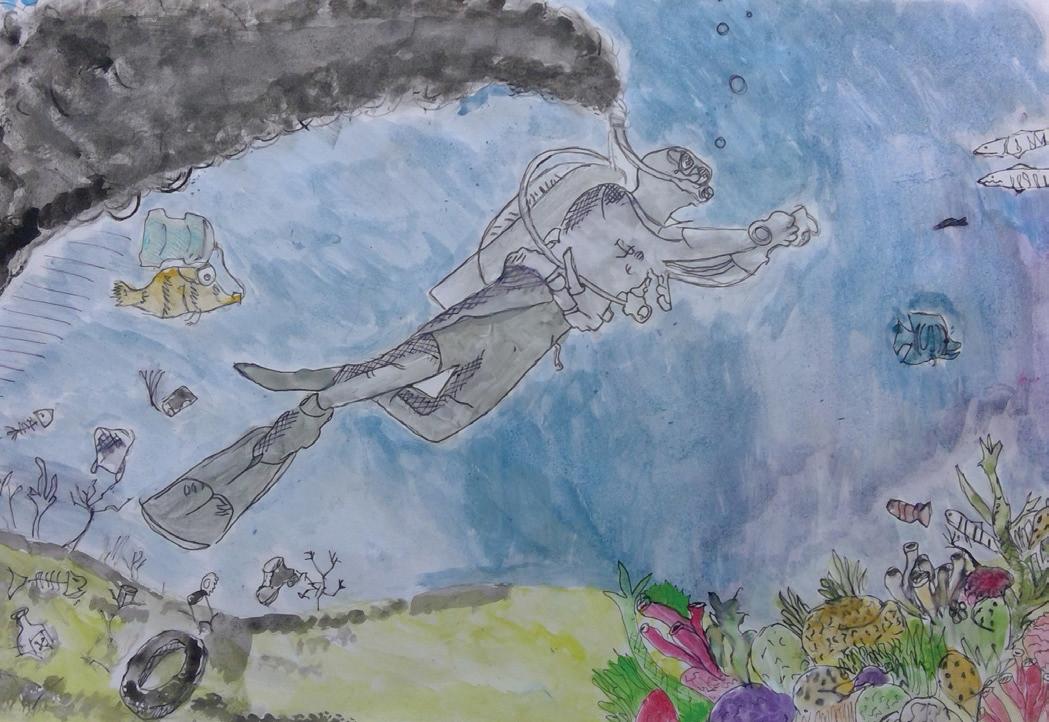







 Sophie Sharp (Third Form, Vanbrugh)
Daisy Drake (Second Form, Vanbrugh)
Katy Stiger (Second Form, Swift)
Xander Luckett (Second Form, Vanbrugh)
Arthur McCormick (Second Form, Vanbrugh)
Harry Rivers (Second Form, Feilden)
Georgia Standbridge (First Form, Queen Anne)
Freddie Cartwright (First Form, Swift)
Freya Richards (First Form, Feilden)
Sophie Sharp (Third Form, Vanbrugh)
Daisy Drake (Second Form, Vanbrugh)
Katy Stiger (Second Form, Swift)
Xander Luckett (Second Form, Vanbrugh)
Arthur McCormick (Second Form, Vanbrugh)
Harry Rivers (Second Form, Feilden)
Georgia Standbridge (First Form, Queen Anne)
Freddie Cartwright (First Form, Swift)
Freya Richards (First Form, Feilden)
COKETHORPE CREATIVITY - PREP ART





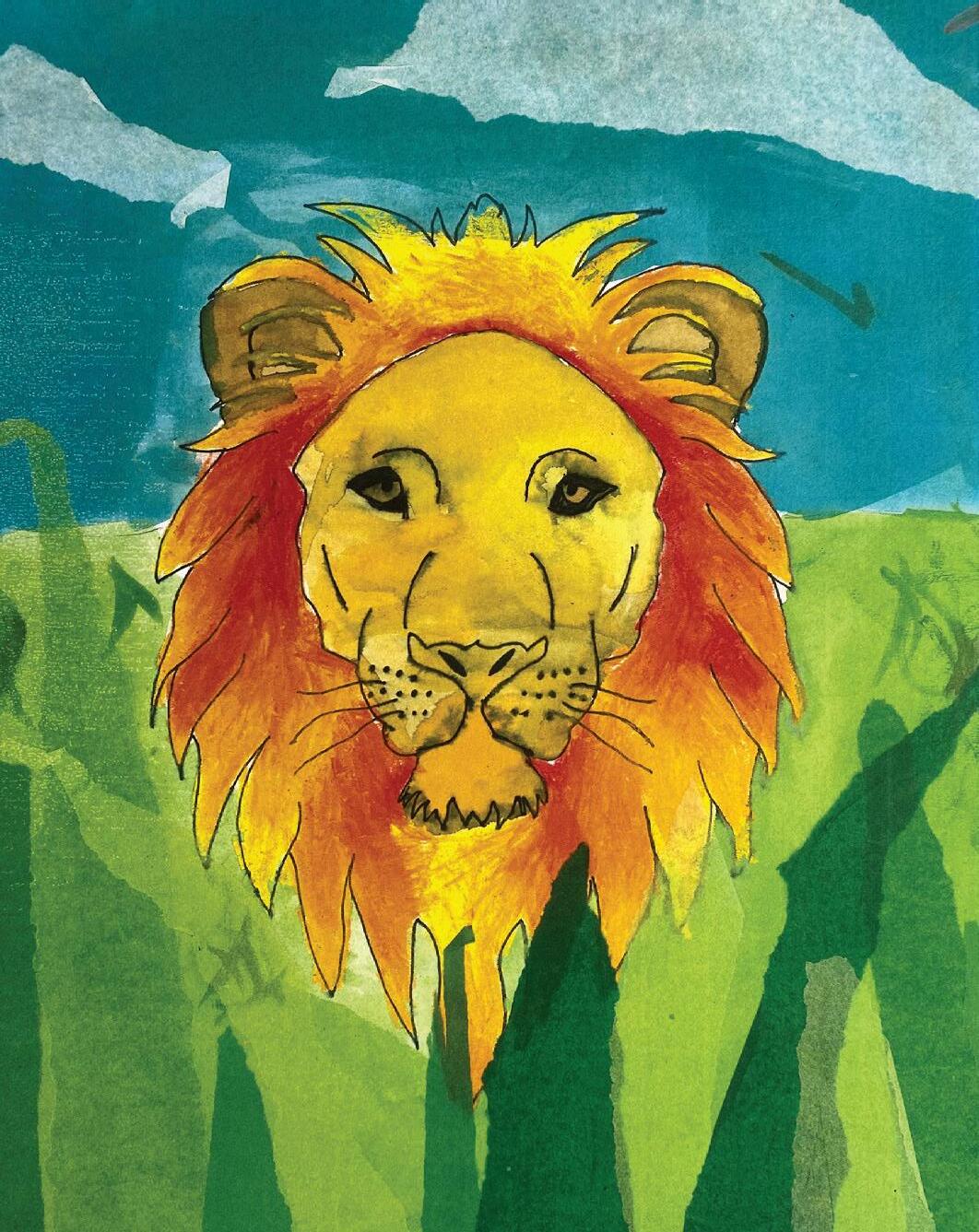

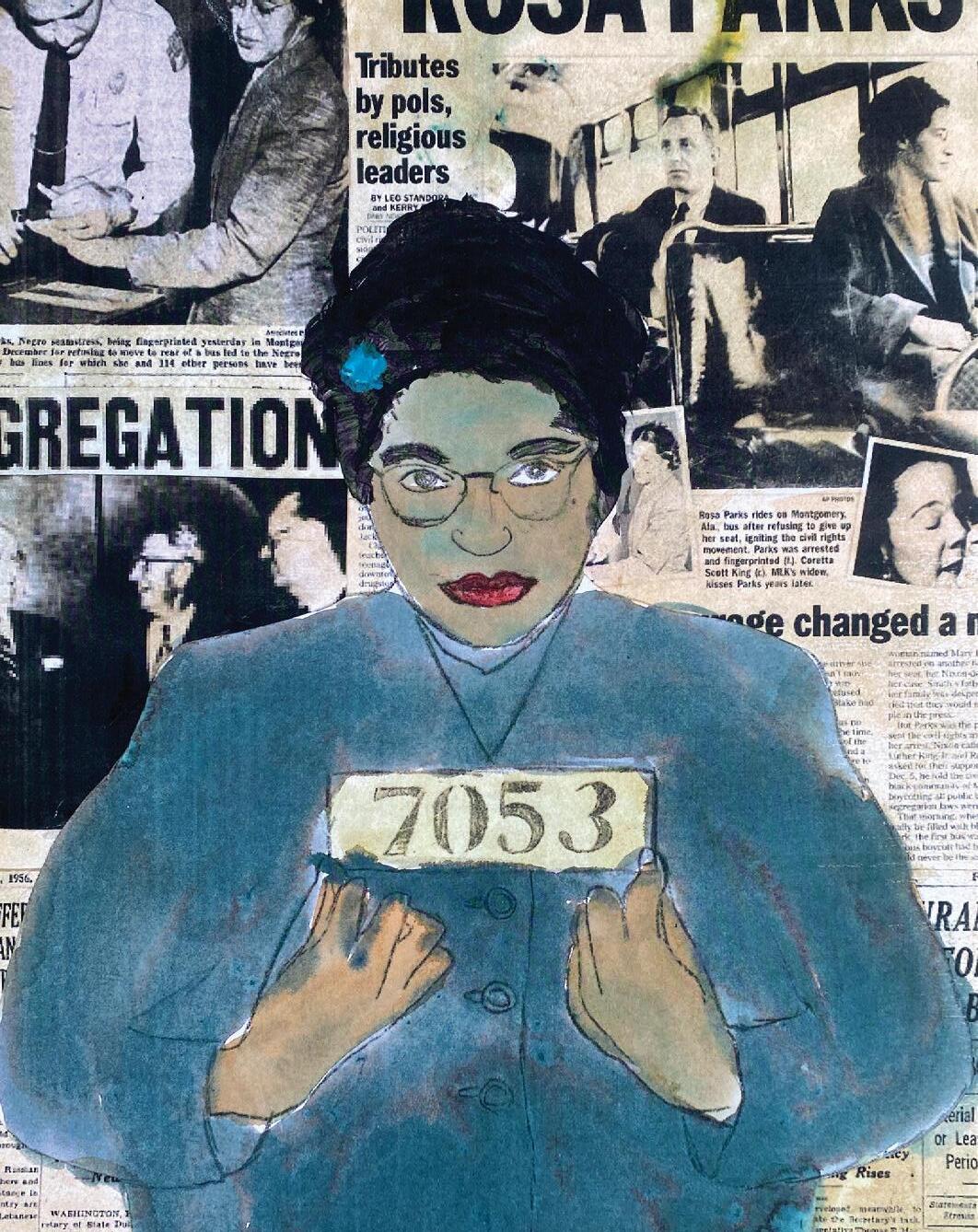


 Kayden Gounongbe (Year 6, Baker)
Yarik Baulin (Year 4, Symonds)
Emmy Theyer (Year 1, Lockwood)
Oscar Rivers (Year 5, Gwyn)
Juno Bayes (Year 5, Symonds)
Xavier Dodd (Year 5, Baker)
Isabelle Noon (Year 6, Baker)
Imogen Jones (Year 5, Baker)
Reggie Firth (Year 2, Baker)
Scarlett Gould (Year 6, Lockwood)
Kayden Gounongbe (Year 6, Baker)
Yarik Baulin (Year 4, Symonds)
Emmy Theyer (Year 1, Lockwood)
Oscar Rivers (Year 5, Gwyn)
Juno Bayes (Year 5, Symonds)
Xavier Dodd (Year 5, Baker)
Isabelle Noon (Year 6, Baker)
Imogen Jones (Year 5, Baker)
Reggie Firth (Year 2, Baker)
Scarlett Gould (Year 6, Lockwood)
What do you do at the School?
I am a teacher of Modern Foreign Languages and a Housemistress

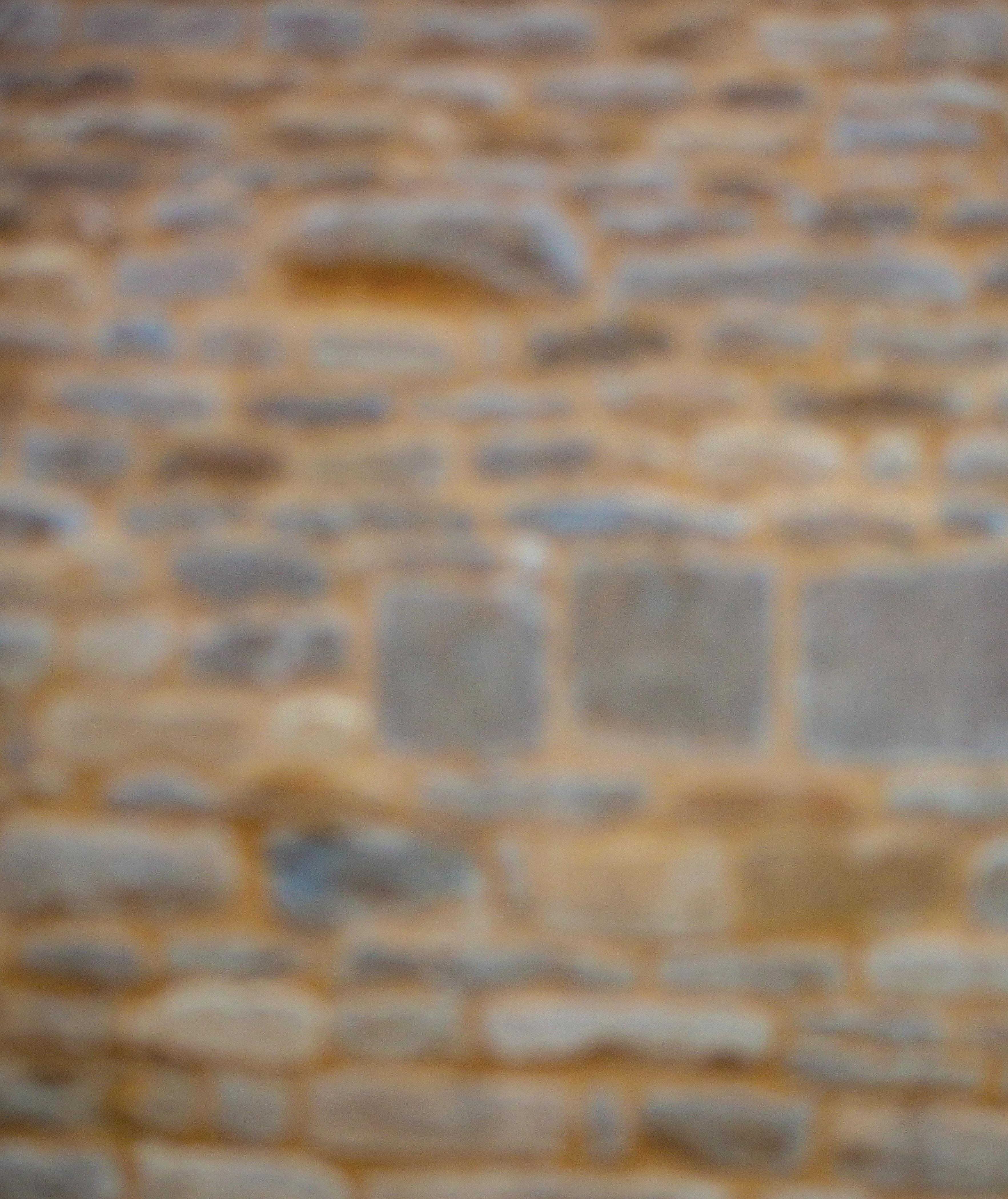
When did you join?
I joined in September of 2007
Can you tell us what you enjoy about it?


I really enjoy the supportive element of my role, which means enabling every child to be the best they can be and achieve their full potential. Goethe once said, ‘Instruction does much, but encouragement everything’, making the rather important point that education is about far more than acquiring knowledge; the social skills that pupils learn whilst in school are just as important as the academic ones. However, the road is often a bumpy one, and help is needed in negotiating friendships, discerning right from wrong, and venturing outside of one’s comfort zone. What I have come to realise over the last ten years or so is that every child is on an individual journey. Sitting down, listening to them, and providing encouragement along the way is key if they are to feel fully supported and ready to embrace all the challenges that lay ahead.
You will have seen many pupils journey through the Senior School to Sixth Form and beyond. How does being part of a House support them as they transition through the School?
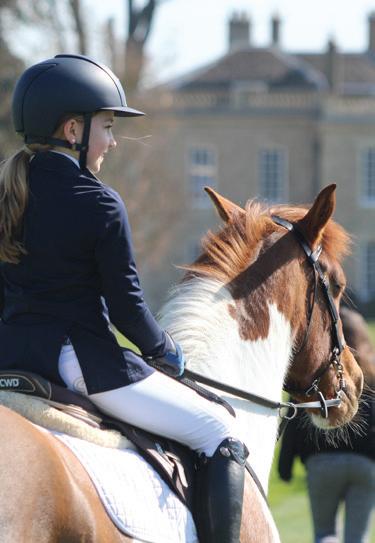

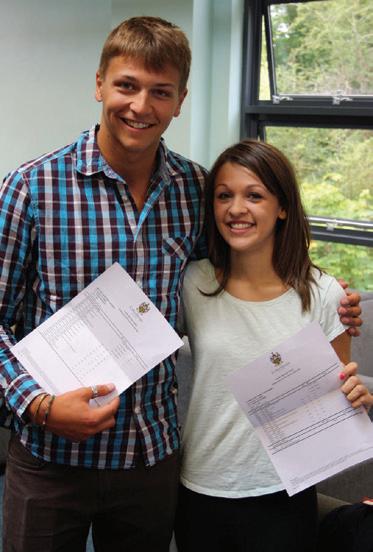
Being part of a House is crucial, firstly because it gives pupils and students a sense of identity and belonging. Members of a House share a purpose and a sense of pride, which manifests itself in their contributions to the various House events and competitions that are organised during the academic year. Working together as a team, which is often what is requested in preparation for a House event, not only offers our Sixth Form students an opportunity to develop important leadership skills, but it also provides younger pupils with ways to discover their talents, step out of their comfort zone, and grow in confidence. The other important element of being part of a House is the supportive environment that is the tutor group. With the average child spending seven years with the same group of people for part of the day, it is easy to see how this soon becomes like a second home, a place where friendships are formed, and support is found. Finally, pupils and students find in the House continuity and stability, and the reassurance that those looking after them are also those who know them the best.

MEET THE SCHOOL MRS SEMENZATO
PUPIL PERSPECTIVES - INTERNATIONAL WOMEN’S DAY
We spoke to Grace Gunn (Lower Sixth, Gascoigne), Amelie Boyle (Third Form, Harcourt) and Miss Ryan, WIT Coordinator, about the way in which International Women’s Day (IWD) was acknowledged in School and the Women Who Changed the World AOB that inspired it.

Wednesday 8 March marked International Women’s Day. What is it and why is it important?
LR - International Women’s Day (IWD) is a global day dedicated to celebrating the achievements of women and addressing issues surrounding gender equality. Having a day dedicated to highlighting this, not only raises awareness of the issues but also offers an opportunity to educate both men and women about gender equity.
How did it come about?
LR - On 28 February 1909, IWD was proposed by Theresa Malkiel to commemorate a protest by a group of female garment workers in New York City in 1857. Inspired by her and other American activists, German Socialist Luise Zeltz suggested an International Women’s Day. 100 women from seventeen different countries supported the idea, and, on 19 March 1911, it was officially marked for the first time. In 1977, the UN declared 8 March as the UN Day for Women’s Rights and World Peace.
What motivated you to do something to mark IWD?
GG - I thought it would be good to do something in School as we often hear it mentioned on social media but not everyone knows a great deal about it. We felt it was important to raise awareness of this important subject and to celebrate the achievements of women.
Can you tell us what you did to acknowledge this in the School?
GG - We decided for each day of that week, that every morning in tutor times we would organise something for pupils to participate in that was linked to IWD.
AB - On the first morning we introduced IWD, and on Tuesday we circulated a powerpoint presentation of women who inspire us. We each chose a different inspirational woman and shared their story with the School.
GG – For Wednesday, we looked at women in sports, particularly the Lionesses and the impact their recent success has had on raising the profile of women’s sport and the impact of this on equity and equality for women across the UK.
AB - On Thursday, we focused on the Arts – more specifically we were addressing the gender pay gap. We ended the week on Friday with a quiz based on the PowerPoints we had shared throughout the week.
Who were the women that inspired you? What made you choose them?
AB – I chose Odette Hallowes, who served in the British Special Operations Executive (SOE) in the Second World War. She conducted espionage and sabotage operations and aided local resistance movements in occupied Europe, working undercover in France by obtaining information and disrupting the enemy in France. Odette was awarded the George Cross and the Legion d’honneur for her incredible acts of heroism and bravery during her service and is the most decorated spy from WWII. Odette was taken to

28
Fresnes Prison and interogated at least fourteen times and tortured for two years, yet she continually responded by saying she had nothing to say.
Why did you choose her?
AB - She and her daughter live near my grandparents so it had a personal connection for me.
Grace, who did you choose as your inspirational woman?
GG – I chose Billie Holiday. I heard one of her songs and thought she had a beautiful voice, I wanted to know more about her and her music. I then found out she had a tragic life and listening to the lyrics 0f one of her most famous songs Strange Fruit, I realised she was talking about racism, discrimination and the lynchings that were happening across the United States of America. She was arrested for singing the song but continued to perform it. Her father died in WWI when he was exposed to gas, but as he was black he was turned away from hospital and died. She wanted to raise awareness – for her, her dad and all people of colour.
Billie was also the first black woman to sing, perform and work with a white orchestra. She went on to win five Grammy Awards and was inducted into the Rock and Rock Hall of Fame in 2000.

Miss Ryan, who did you choose?
LR - I chose to highlight the important work of Mary Anning. The inspiration came from a recent visit to the Natural History Museum, which is filled with fossils she is responsible for finding. At the age of twelve she discovered a fossil protruding from the cliffs on the Jurassic Coast and excavated the site, it was the first full skeleton to be found there. Her work in discovering fossils and species of dinosaur is why it is an UNESCO protected area. She was a scientist in Victorian times, called a weird creature and told she had a bitter personality. It has also been cited that she would now be running the Palaeontology Department in Oxford or Cambridge. There are lots of places that have fossils she discovered, however, the people who have been credited with finding them are the men that have donated them, not her. In the Natural History Museum they are accredited to her, with lots of facts about her too.

You all chose someone different, but all were equally fascinating and inspirational in different ways and you all have a personal reason for choosing them. How did you become involved in this?
LR - Grace had the idea to open the eyes of the School community to women who have changed history – whether that be science, social movements, history, culture or politics. She then approached me to ask whether I would support it which I was eager to do, so we set up the AOB to celebrate women that are changing the world.
GG – I had the idea in the Fifth Form but thought I would have more flexibility to do it in the Sixth Form. It feels important to me to highlight some of the things we have today that are due to women in history or have been accredited to men.
AB - In the Women Who Changed the World AOB, we celebrate women that have shown bravery, perseverance and who have contributed to making the world a better place.
Why do you feel this is important?
AB - It is good for people to look back at history and see how we can make changes going forward, change our ways and strive towards making an equal community for everyone.
In terms of equity in the School or on a wider level, is there anything more we could be doing here at Cokethorpe?
LR – The world as a whole has a long way to move forward. There are still women in the world who cannot legally drive, gain access to education or are otherwise treated as second-class citizens. The conversation should really be about how we educate and advocate for those women who do not have what we have here. There are still fights in the UK for equal women’s rights, for example the huge levels of disparity in the gender pay gap in all sorts of industries.
AB - Trying to educate those who might currently benefit from a lack of equity, that it is not an accusation but a desire to have a conversation about it. Just because you are asking for equity, there is not a bad guy and good guy as such, we are just asking for two humans to be equal.
GG – We were thinking about the possibility of having ‘a woman a week’ on our social media channels, to highlight her achievements and why she is important in today’s society – to keep the momentum going and continue to work towards educating people about the issues surrounding equity and equality.
STAFF NEWS
In the next edition... a focus on... Pastoral and Wellbeing
29
Starters
Mr G Pisanello, Teacher of Mathematics
Leavers
Mrs J Miller, Teacher of English
Mr N Yu, Teacher of Mathematics
Congratulations to all our staff who took part in the Pink Ribbon Walk at Blenheim Palace, raising money for Breast Cancer Now. Mrs S Sheer, Registrar, and Miss C Hill, Mrs L Jeffrey and Mrs F Ford from our Catering Team walked an incredible 20-miles raising money for this wonderful cause.
12.30pm-6.30pm, Saturday 9 September 2023 featuring
Deadbeat Apostles | George Lewis
Blue Stew | Stage Dive Dave | Winestain
Family Afternoon Festival | Local Food Trucks
Book tickets at cokethorpe.org

Gig on the Green





















































































 Sophie Sharp (Third Form, Vanbrugh)
Daisy Drake (Second Form, Vanbrugh)
Katy Stiger (Second Form, Swift)
Xander Luckett (Second Form, Vanbrugh)
Arthur McCormick (Second Form, Vanbrugh)
Harry Rivers (Second Form, Feilden)
Georgia Standbridge (First Form, Queen Anne)
Freddie Cartwright (First Form, Swift)
Freya Richards (First Form, Feilden)
Sophie Sharp (Third Form, Vanbrugh)
Daisy Drake (Second Form, Vanbrugh)
Katy Stiger (Second Form, Swift)
Xander Luckett (Second Form, Vanbrugh)
Arthur McCormick (Second Form, Vanbrugh)
Harry Rivers (Second Form, Feilden)
Georgia Standbridge (First Form, Queen Anne)
Freddie Cartwright (First Form, Swift)
Freya Richards (First Form, Feilden)










 Kayden Gounongbe (Year 6, Baker)
Yarik Baulin (Year 4, Symonds)
Emmy Theyer (Year 1, Lockwood)
Oscar Rivers (Year 5, Gwyn)
Juno Bayes (Year 5, Symonds)
Xavier Dodd (Year 5, Baker)
Isabelle Noon (Year 6, Baker)
Imogen Jones (Year 5, Baker)
Reggie Firth (Year 2, Baker)
Scarlett Gould (Year 6, Lockwood)
Kayden Gounongbe (Year 6, Baker)
Yarik Baulin (Year 4, Symonds)
Emmy Theyer (Year 1, Lockwood)
Oscar Rivers (Year 5, Gwyn)
Juno Bayes (Year 5, Symonds)
Xavier Dodd (Year 5, Baker)
Isabelle Noon (Year 6, Baker)
Imogen Jones (Year 5, Baker)
Reggie Firth (Year 2, Baker)
Scarlett Gould (Year 6, Lockwood)












